Vol. Y-¥-
THE MESSENGER
Copyright 1928 by J. Harris Welsh
NOVEMBER,
1928
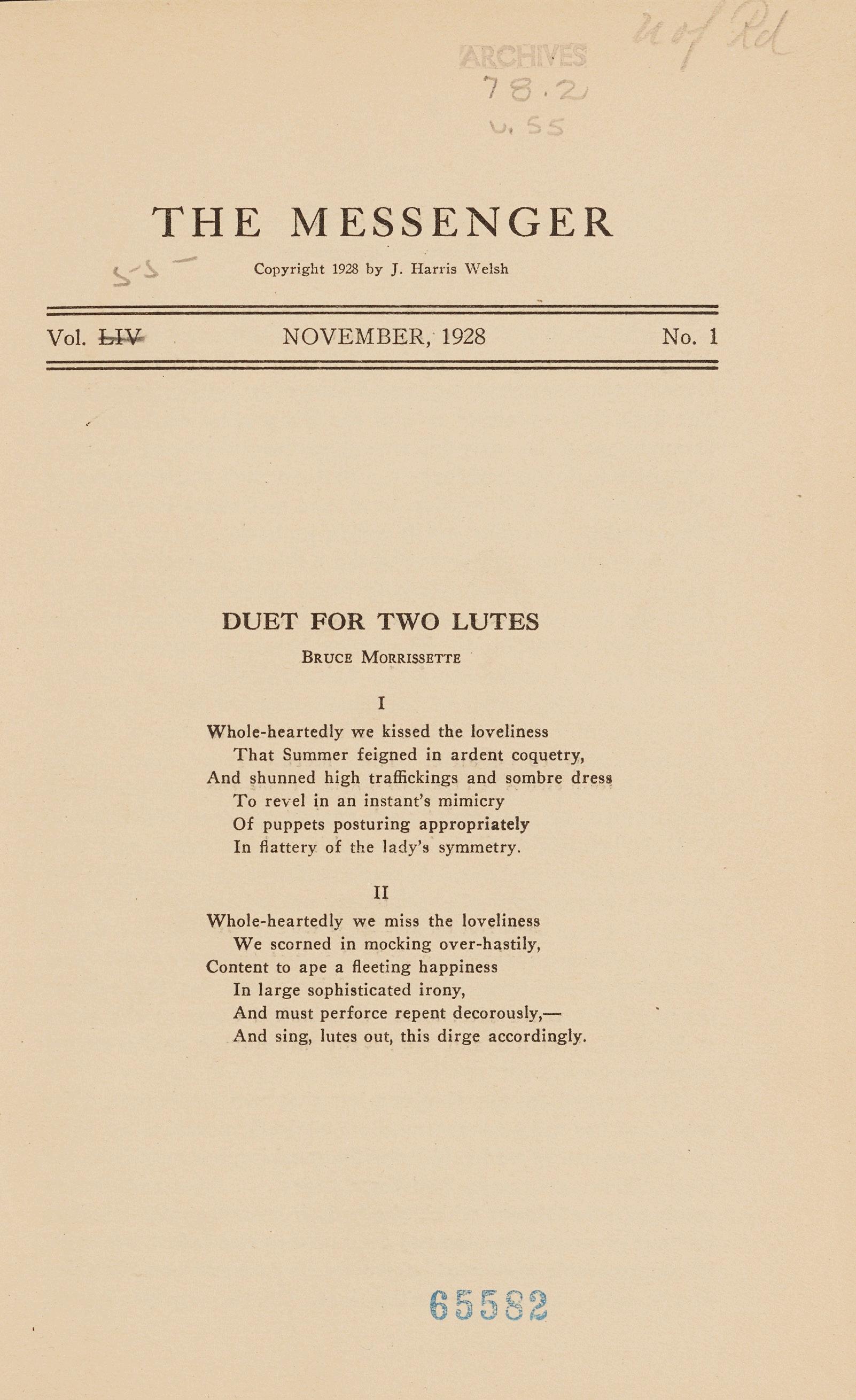
DUET FOR TWO LUTES
BRUCE MoRRISSEITE
I
Whole-heartedly we kissed the loveliness That Summer feigned in ardent coquetry, And shunned high traffickings and sombre dress To revel in an instant's mimicry Of puppets posturing appropriately In flattery of the lady's symmetry
II
Whole-heartedly we miss the loveliness We scorned in mocking over-hastily , Content to ape a fleeting happiness In large sophisticated irony, And must perforce repent decorously,And sing, lutes out, this dirge accordingly.
No . 1

THE RIVER
PAUL SCARBOROUGH
THE River sang on its seaward way as though all were well with the world, as though mankind had never known the dull poignancy of pain. Its broad bosom reflected the intense blueness of a September sky, and a little of its intangible sadn e ss. The high cliffs on either side of the River were clothed in the dreamy haze of an early Indian summer which seemed to brood with infinite tenderness over the placid water and the country side around it. A kingfisher dived, and an instant later flapped heavily away, clutching a fish within its beak.
The woman was not aware of these things. Silently she sata thing of stone. From her lofty perch on the left bank of the river she simply sat and stared. Dark she was, and beautiful as few women are beautiful. The listless breeze of early afternoon stirred for a moment her dusky hair, whipping a few tendrils against the ivory pallor of her cheek. But her eyes, the great wide eyes of a blue not less intense than the river's bosom, seemed hardly to be alive They merely gazed away in the dreamy immensity of a sleeping world. Once the full lips moved, only to form again a scarlet slash against the dead white face.
Only last night-God, it seemed a million years, and then again less than an hour. A crashing down of everything; the end of a dream she had passionately prayed would endure forever! She had been too happy-that was it, too happy. Would she ever know happiness again? Ah, just to know that! Just to exchange the tortured chaos of her heart for the sublime peace of this azure afternoon. She looked down at the river. It laughed up at her and then went murmuring on its eternal pilgrimage.
She wanted to stop thinking but that was impossible. The wheels of her mind ground on mercilessly, inexorably.
The woman stirred slightly without taking her eyes from the river. Three years ago, just three years .... She and George coming to the Manor which she had so extravagantly admired. Its four great columns seemed even now to rise before her eyes; its incomparable avenue of boxwoods, its rose gardens, the crepe myrtle walk that led down to the river. Oh, the exquisite beauty
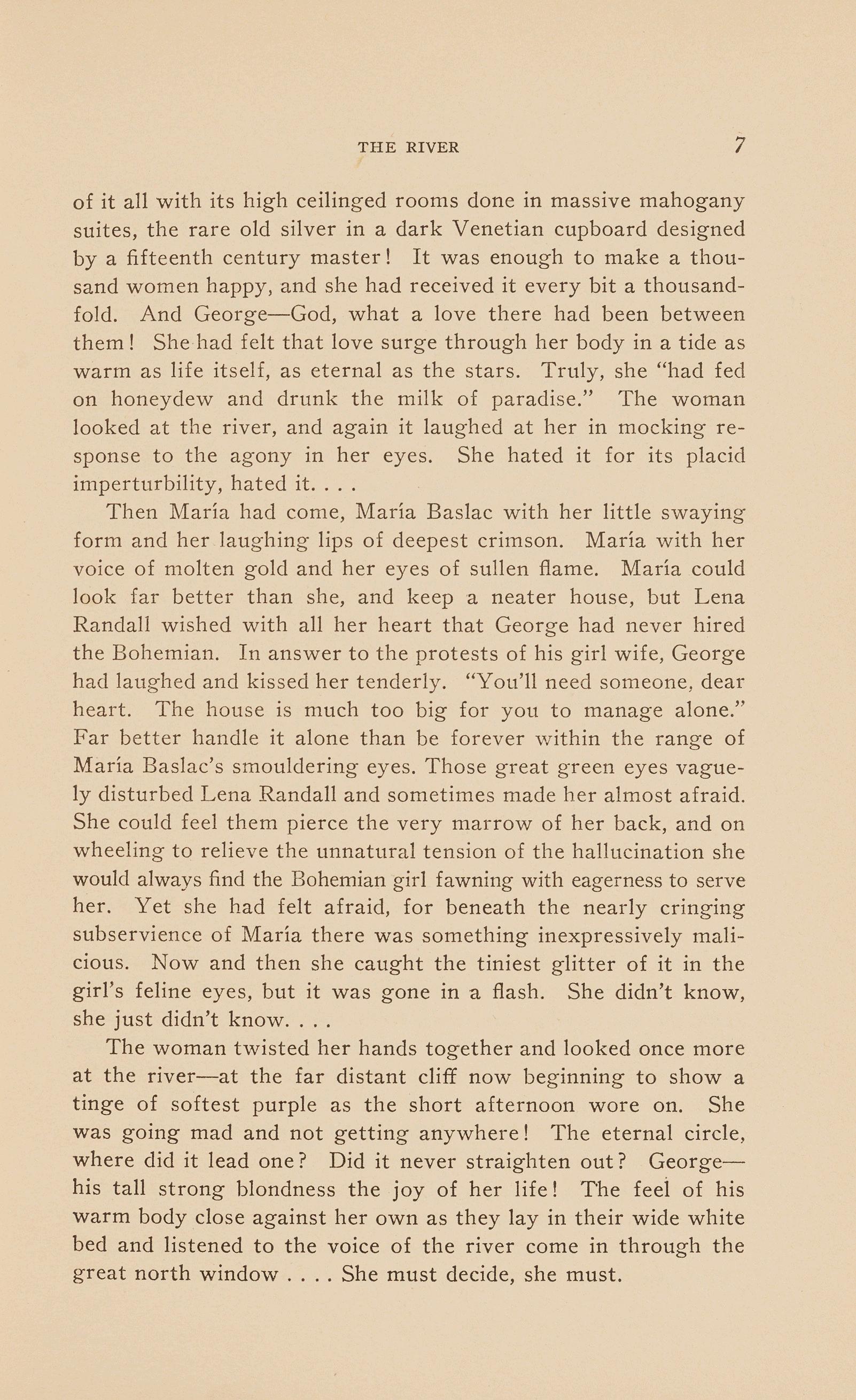
of it all with its high ceilinged rooms done in massive mahogany suites, the rare old silver in a dark Venetian cupboard designed by a fifteenth century master! It was enough to make a thousand women happy, and she had received it every bit a thousandfold. And George-God, what a love there had been between them! She had felt that love surge through her body in a tide as warm as life itself, as eternal as the stars. Truly, she "had fed on honeydew and drunk the milk of paradise." The woman looked at the river, and again it laughed at her in mocking response to the agony in her eyes. She hated it for its placid imperturbility, hated it ....
Then Maria had come, Maria Baslac with her little swaying form and her laughing lips of deepest crimson. Maria with her voice of molten gold and her eyes of sullen flame. Maria could look far better than she, and keep a neater house, but Lena Randall wished with all her heart that George had never hired the Bohemian. In answer to the protests of his girl wife, George had laughed and kissed her tenderly. "You'll need someone, dear heart. The house is much too big for you to manage alone." Far better handle it alone than be forever within the range of Maria Baslac's smouldering eyes. Those great green eyes vaguely disturbed Lena Randall and sometimes made her almost afraid. She could feel them pierce the very marrow of her back, and on wheeling to relieve the unnatural tension of the hallucination she would always find the Bohemian girl fawning with eagerness to serve her. Yet she had felt afraid, for beneath the nearly cringing subservience of Maria there was something inexpressively malicious. Now and then she caught the tiniest glitter of it in the girl's feline eyes, but it was gone in a flash She didn't know, she just didn't know ....
The woman twisted her hands together and looked once more at the river-at the far distant cliff now beginning to show a tinge of softest purple as the short afternoon wore on. She was going mad and not getting anywhere! The eternal circle, where did it lead one? Did it never straighten out? Georgehis tall strong blondness the joy of her life! The feei of his warm body close against her own as they lay in their wide white bed and listened to the voice of the river come in through the great north window .... She must decide, she must.

THE MESSENGER
The woman swiftly ran the scale of passing years until last night. Just twenty-four hours ago, but such stupendous hours, filled as they were with unbelievable crucifixion of spirit. Colonel Dabney's party across the river at Green Plains. She and George were invited; of course they would go; they always did. The colonel's parties were the talk of the river country, his liquors the finest in all Virginia. And as for Mrs. Dabney, she was the most perfect hostess Lena had ever seen. She knew just how such affairs should be handled, and Lena reveled in the gracious easy way in which the colonel's lady did it. But why was she thinking of the niceties of etiquette now? Strange how her mind was lurching in all directions at once. The woman moaned and her dark head drooped.
Colonel and Mrs. Dabney had come for George and her in the colonel's speedboat . Old Dabney had a pronounced passion for speedboats-was always gett ing a new one. But why did her mind persist in reverting to unimportant things? She was going mad that was all-going mad. George had meant such an infinite lot, had been her life and soul and good shepherd all in one. Lena Randall broke into wild sobbing and slid from the stone where she was sitting onto the ground where she crouched like a desperate wild thing. Oh, to stop thinking , but the inevitable wheels ground on and on!
How viv idly it all came back to her! George too sick to leave his bed, but begging her t o go on with the colonel. Old Diggs their handy man could look after George like a mother. She, protesting with all the heart of her that her place was with her husband, and finally going away with the highly possessive colonel. With one last look at the manor standing tall and white in the soft moonlight, she had followed her gallant escort clown to the boat. The little craft shot out across the blue-black surface of the river, dotted here and there with silver star shapes, and presently nosed along the wharf of Green Plains. From there they came to the brilliantly lighted manor house.
The party finally wore itself out, though everybody seemed to be happy and having a delightful time save herself, and she was once more on the river. To get to George-she could think of nothing else. George needed her. How the boat crept, and

the Colonel always boasting of its speed! The Manor wharf loomed up before them, and as the boat touched the pier, Lena stepped ashore. The Colonel had protested that they should not bid such brief good-nights, but with a little laugh she pressed his hand and fled into the house. Removing her shoes to avoid awakening her husband, Lena crept up the steps to the open door of the still dark bedroom. The moon's beams streamed through the wide north window-she could see the dim outline of that same moon now out yonder in the deepening blue-revealing to her the end of all time, all happiness, all joys on this or any other earth. Frozen she stood with her hand against her mouth as Maria Baslac, her superb body gleaming white in the moonlight, slipped noislessly from the bed. With a smothered ejaculation the Bohemian clutched her few clothes to her breasts and stood staring, wild-eyed. Another moment, and she had glided through the door where Lena was rigidly propped. A slight patter of bare feet, the subdued bang of a door .... absolute silence.
The twilight descended slowly and the Dog-star gleamed red in the gathering dusk. The woman huddled on the ground shivering. Clutching at the rock beside her she steadied herself and painfully rose to her feet, only to be shaken by a violent fit of trembling. A newly-awakened wind tugged at her skirts and lifted the jet black hair from her forehead. A light twinkled off in the thickening gloom-perhaps some river boat bound for Jamestown. The woman hesitated a moment, then walked to the edge of the cliff and looked down. A narrow strip of beach, a line of faintest white, that was all she saw. Two, three steps, and her form seemed to float downward through the dusk. Far below, the river continued its quiet music. There was a note of subdued sadness in its voice.

LETTERS CONCERNING THE LADY IN GREY
ARCHIBALD BUTTS
(Philippe de Murhaut writes to his friend, Jacques Claire• monde, and tells of his adventures in Paris)
PARIS, JUNE 12.-Y ou will have learned, by the time this letter reaches you, of my estrangement from my estimable father. The facts are few and simple, and perhaps I am not altogether blameless. The old tyrant-as is the custom with old tyrants-was about to force his beautiful daughter, my twin, into a marriage with the eldest son of the fat and highly opulent Herr von Meckleberg. Fate decreed otherwise, however, for no sooner had I met his young lordship than I came to share my sister's hearty dislike for him. Dislike grew into loathing. You cannot conceive, my dear Jacques, of the horror with which I regarded the approaching wedding. Whenever, indeed, I chanced to glimpse his young lordship of Meckleberg, I would turn pale with a desire to strangle him . Oh, he was really a detestible fellow-fat, puffy, oily-skinned, and bearing continually a foolish smile on his expansive, shiny, red face. The end was to be expected. I picked a quarrel with our lordling, and we met on the field. The poor fellow was terribly frightened, for his swordmanship was unspeakably crude. But he was gamer than I had expected, and I found it in my heart to pity him. Instead of killing him as I had intended, I merely poked him in the gizzard and laid his lordship low-I hope for several weeks.
Of course, the senior Von Meckleberg immediately severed all connections with our family, and my dear papa, enfuriated at seeing the Meckleberg millions recede beyond his grasp, showed me the door. And so you find me, my dear Jacques, living very frugally in Paris upon what littl e my mother and grateful sister are able to smuggle by post.
Here am I, the eldest son of a Marquis, dwelling in the top floor of a hideous old grey stone rooming house on the wrong side of the Seine. And, wonderful to relate, I find it entirely to my liking. In the first place, I no longer feel the oppressing hand of my worthy papa. I have won freedom, and that is no small gain in exchange for comfort. I have enough to eat, clothes
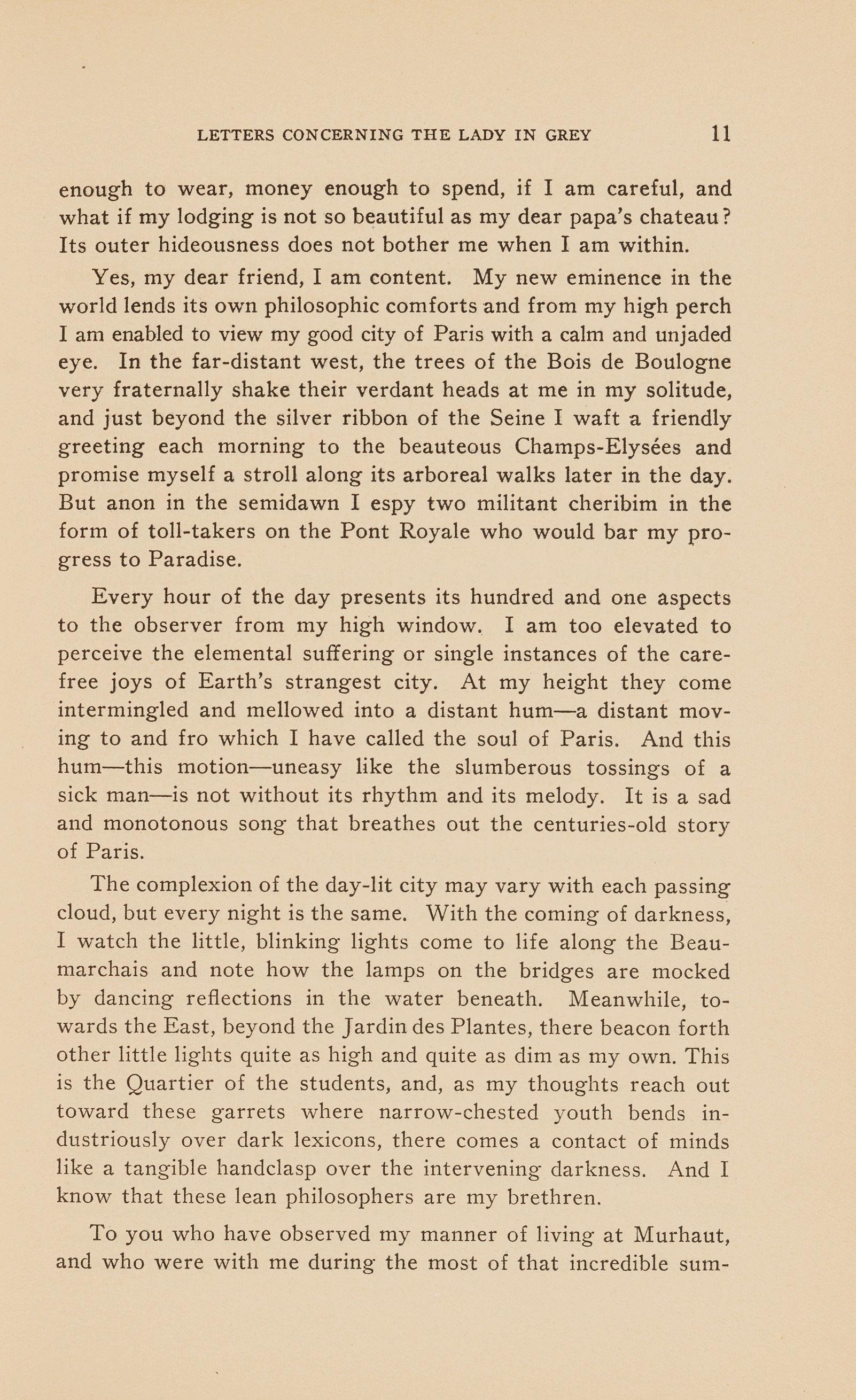
enough to wear, money enough to spend, if I am careful, and what if my lodging is not so beautiful as my dear papa's chateau? Its outer hideousness does not bother me when I am within.
Yes, my dear friend, I am content. My new eminence in the world lends its own philosophic comforts and from my high perch I am enabled to view my good city of Paris with a calm and unjaded eye. In the far-distant west, the trees of the Bois de Boulogne very fraternally shake their verdant heads at me in my solitude, and just beyond the silver ribbon of the Seine I waft a friendly greeting each morning to the beauteous Champs-Elysees and promise myself a stroll along its arboreal walks later in the day. But anon in the semidawn I espy two militant cheribim in the form of toll-takers on the Pont Royale who would bar my progress to Paradise.
Every hour of the day presents its hundred and one aspects to the observer from my high window. I am too elevated to perceive the elemental suffering or single instances of the carefree joys of Earth's strangest city. At my height they come intermingled and mellowed into a distant hum-a distant moving to and fro which I have called the soul of Paris. And this hum-this motion-uneasy like the slumberous tossings of a sick man-is not without its rhythm and its melody. It is a sad and monotonous song that breathes out the centuries-old story of Paris.
The complexion of the day-lit city may vary with each passing cloud, but every night is the same. With the coming of darkness, I watch the little, blinking lights come to life along the Beaumarchais and note how the lamps on the bridges are mocked by dancing reflections in the water beneath. Meanwhile, towards the East, beyond the Jardin des Plantes, there beacon forth other little lights quite as high and quite as dim as my own. This is the Quartier of the students, and, as my thoughts reach out toward these garrets where narrow-chested youth bends industriously over dark lexicons, there comes a contact of minds like a tangible handclasp over the intervening darkness. And I know that these lean philosophers are my brethren.
To you who have observed my manner of living at Murhaut, and who were with me during the most of that incredible sum-
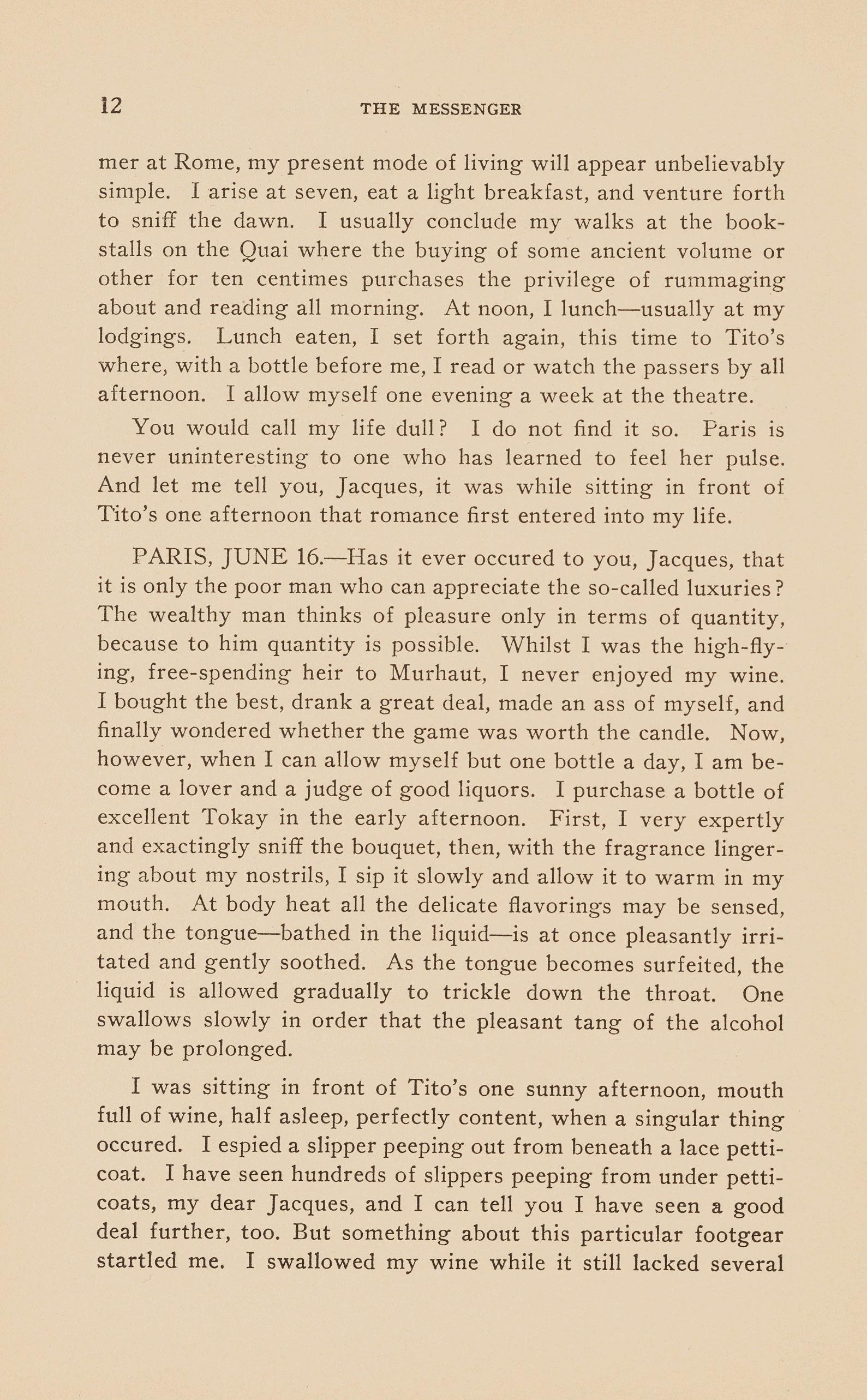
mer at Rome, my present mode of living will appear unbelievably simple. I arise at seven, eat a light breakfast, and venture forth to sniff the dawn. I usually conclude my walks at the bookstalls on the Quai where the buying of some ancient volume or other for ten centimes purchases the privilege of rummaging about and reading all morning. At noon, I lunch-usually at my lodgings. Lunch eaten, I set forth again, this time to Tito's where, with a bottle before me, I read or watch the passers by all afternoon. I allow myself one evening a week at the theatre.
You would call my life dull? I do not find it so. Paris is never uninteresting to one who has learned to feel her pulse. And let me tell you, Jacques, it was while sitting in front of Tito's one afternoon that romance first entered into my life.
PARIS, JUNE 16.-Has it ever occured to you, Jacques, that it is only the poor man who can appreciate the so-called luxuries? The wealthy man thinks of pleasure only in terms of quantity, because to him quantity is possible. Whilst I was the high-flying, free-spending heir to Murhaut, I never enjoyed my wine. I bought the best, drank a great deal, made an ass of myself, and finally wondered whether the game was worth the candle. Now, however, when I can allow myself but one bottle a day, I am become a lover and a judge of good liquors. I purchase a bottle of excellent Tokay in the early afternoon. First, I very expertly and exactingly sniff the bouquet, then, with the fragrance lingering about my nostrils, I sip it slowly and allow it to warm in my mouth. At body heat all the delicate flavorings may be sensed, and the tongue-bathed in the liquid-is at once pleasantly irritated and gently soothed. As the tongue becomes surfeited, the liquid is allowed gradually to trickle down the throat. One swallows slowly in order that the pleasant tang of the alcohol may be prolonged.
I was sitting in front of Tito's one sunny afternoon, mouth full of wine, half asleep, perfectly content, when a singular thing occured. I espied a slipper peeping out from beneath a lace petticoat. I have seen hundreds of slippers peeping from under petticoats, my dear Jacques, and I can tell you I have seen a good deal further, too. But something about this particular footgear startled me. I swallowed my wine while it still lacked several
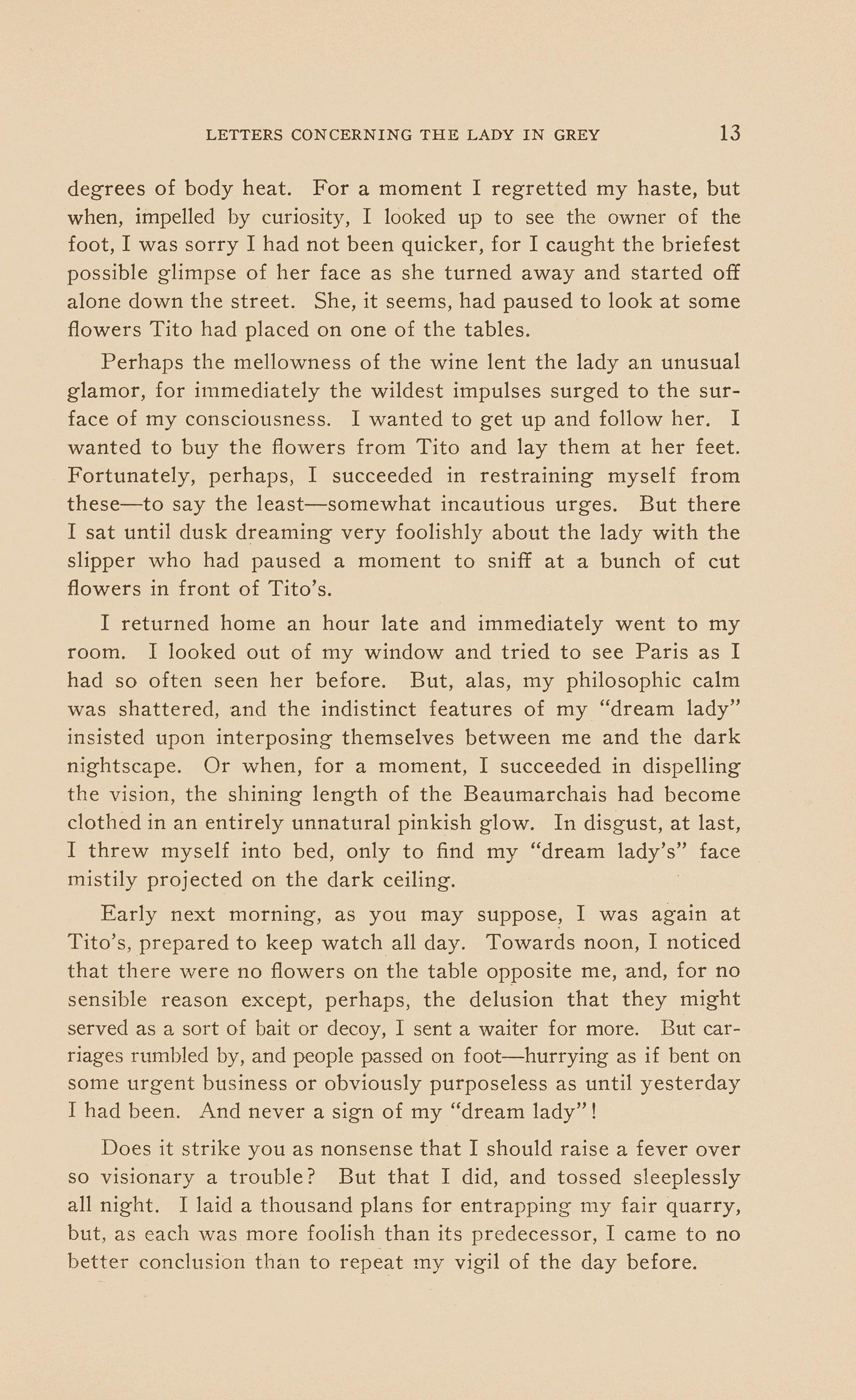
degrees of body heat. For a moment I regretted my haste, but when, impelled by curiosity, I looked up to see the owner of the foot, I was sorry I had not been quicker, for I caught the briefest possible glimpse of her face as she turned away and started off alone down the street. She, it seems, had paused to look at some flowers Tito had placed on one of the tables.
Perhaps the mellowness of the wine lent the lady an unusual glamor, for immediately the wildest impulses surged to the surface of my consciousness. I wanted to get up and follow her. I wanted to buy the flowers from Tito and lay them at her feet. Fortunately, perhaps, I succeeded in restraining myself from these-to say the least-somewhat incautious urges. But there I sat until dusk dreaming very foolishly about the lady with the slipper who had paused a moment to sniff at a bunch of cut flowers in front of Tito's.
I returned home an hour late and immediately went to my room. I looked out of my window and tried to see Paris as I had so often seen her before. But, alas, my philosophic calm was shattered, and the indistinct features of my "dream lady" insisted upon interposing themselves between me and the dark nightscape. Or when, for a moment, I succeeded in dispelling the vision, the shining length of the Beaumarchais had become clothed in an entirely unnatural pinkish glow. In disgust , at last, I threw myself into bed, only to find my "dream lady's" face mistily projected on the dark ceiling.
Early next morning, as you may suppose, I was again at Tito's , prepared to keep watch all day. Towards noon, I noticed that there were no flowers on the table opposite me, and, for no sensible reason except, perhaps, the delusion that they might served as a sort of bait or decoy, I sent a waiter for more. But carriages rumbled by, and people passed on foot-hurrying as if bent on some urgent business or obviously purposeless as until yesterday I had been. And never a sign of my "dream lady"!
Does it strike you as nonsense that I should raise a fever over so visionary a trouble? But that I did, and tossed sleeplessly all night. I laid a thousand plans for entrapping my fair quarry, but , as e ach was more foolish than its predecessor, I came to no better conclusion than to repeat my vigil of the day before.
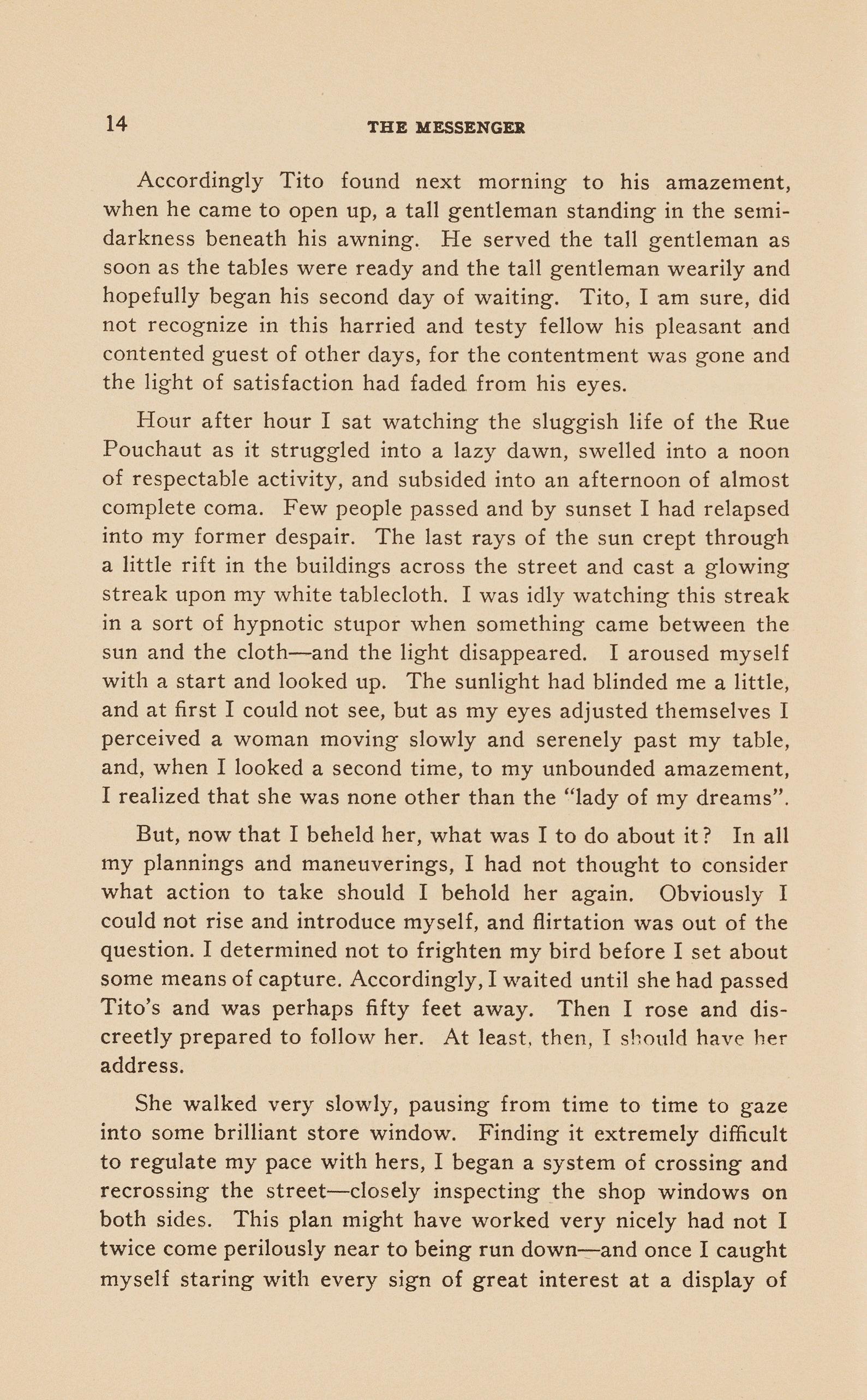
THE MESSENGElt
Accordingly Tito found next morning to his amazement, when he came to open up, a tall gentleman standing in the semidarkness beneath his awning. He served the tall gentleman as soon as the tables were ready and the tall gentleman wearily and hopefully began his second day of waiting. Tito, I am sure, did not recognize in this harried and testy fellow his pleasant and contented guest of other days, for the contentment was gone and the light of satisfaction had faded from his eyes.
Hour after hour I sat watching the sluggish life of the Rue Pouchaut as it struggled into a lazy dawn, swelled into a noon of respectable activity, and subsided into an afternoon of almost complete coma. Few people passed and by sunset I had relapsed into my former despair. The last rays of the sun crept through a little rift in the buildings across the street and cast a glowing streak upon my white tablecloth. I was idly watching this streak in a sort of hypnotic stupor when something came between the sun and the cloth-and the light disappeared. I aroused myself with a start and looked up. The sunlight had blinded me a little, and at first I could not see, but as my eyes adjusted themselves I perceived a woman moving slowly and serenely past my table, and, when I looked a second time, to my unbounded amazement, I realized that she was none other than the "lady of my dreams".
But, now that I beheld her, what was I to do about it? In all my plannings and maneuverings, I had not thought to consider what action to take should I behold her again. Obviously I could not rise and introduce myself, and flirtation was out of the question. I determined not to frighten my bird before I set about some means of capture. Accordingly, I waited until she had passed Tito's and was perhaps fifty feet away. Then I rose and discreetly prepared to follow her. At least. then, I sl~ould have her address.
She walked very slowly, pausing from time to time to gaze into some brilliant store window. Finding it extremely difficult to regulate my pace with hers, I began a system of crossing and recrossing the street-closely inspecting the shop windows on both sides. This plan might have worked very nicely had not I twice come perilously near to being run down-and once I caught myself staring with every sign of great interest at a display of
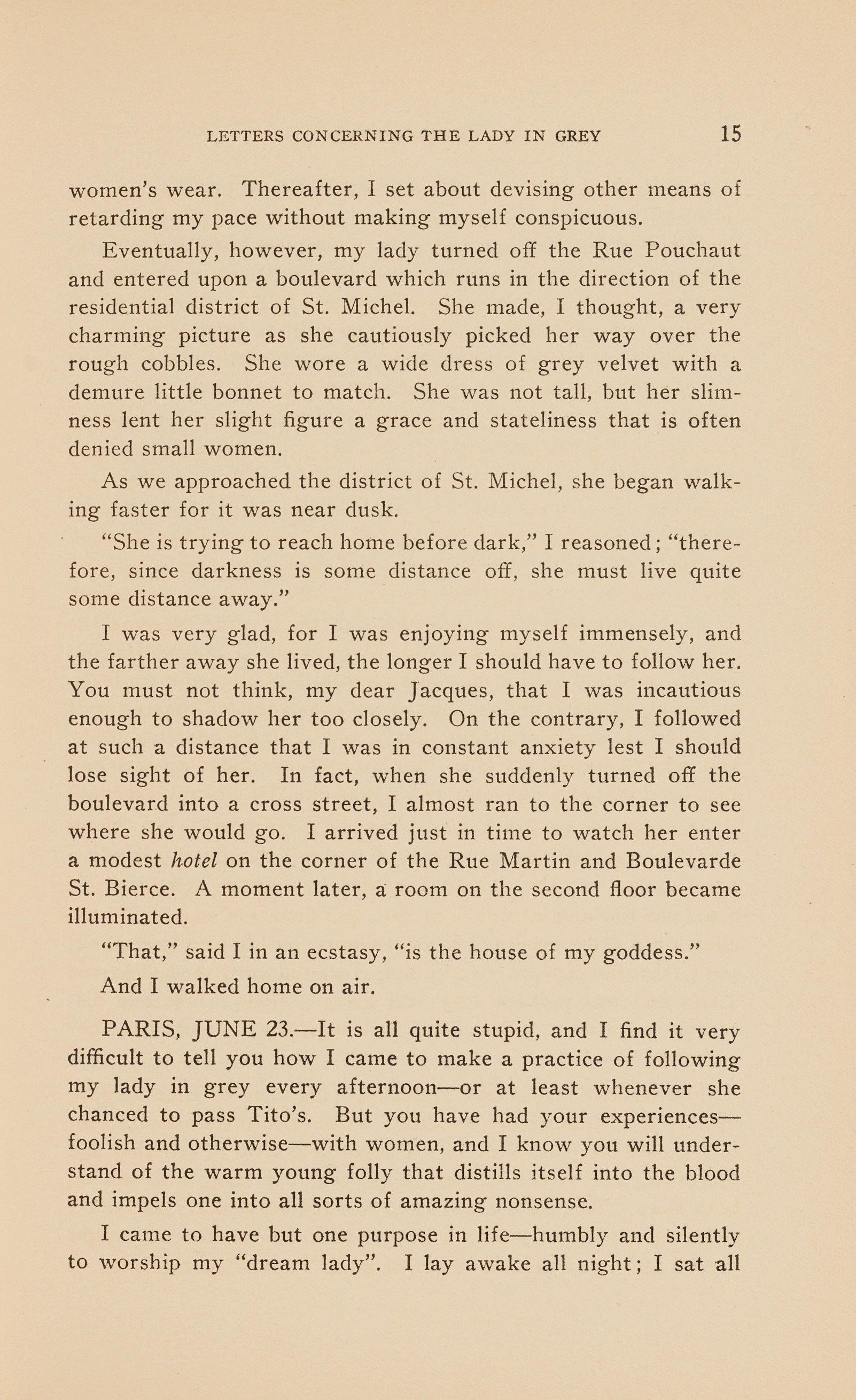
women's wear. Thereafter, I set about devising other means of retarding my pace without making myself conspicuous.
Eventually, however, my lady turned off the Rue Pouchaut and entered upon a boulevard which runs in the direction of the residential district of St. Michel. She made, I thought, a very charming picture as she cautiously picked her way over the rough cobbles. She wore a wide dress of grey velvet with a demure little bonnet to match. She was not tall, but her slimness lent her slight figure a grace and stateliness that is often denied small women.
As we approached the district of St. Michel, she began walking faster for it was near dusk.
"She is trying to reach home before dark," I reasoned; "therefore, since darkness is some distance off, she must live quite some distance away."
I was very glad, for I was enjoying myself immensely, and the farther away she lived, the longer I should have to follow her. You must not think, my dear Jacques, that I was incautious enough to shadow her too closely. On the contrary, I followed at such a distance that I was in constant anxiety lest I should lose sight of her. In fact, when she suddenly turned off the boulevard into a cross street, I almost ran to the corner to see where she would go. I arrived just in time to watch her enter a modest hotel on the corner of the Rue Martin and Boulevarde St. Bierce. A moment later, a:room on the second floor became illuminated.
"That," said I in an ecstasy, "is the house of my goddess."
And I walked home on air.
PARIS, JUNE 23.-It is all quite stupid, and I find it very difficult to tell you how I came to make a practice of following my lady in grey every afternoon-or at least whenever she chanced to pass Tito's. But you have had your experiencesfoolish and otherwise-with women, and I know you will understand of the warm young folly that distills itself into the blood and impels one into all sorts of amazing nonsense.
I came to have but one purpose in life-humbly and silently to worship my "dream lady". I lay awake all night; I sat all
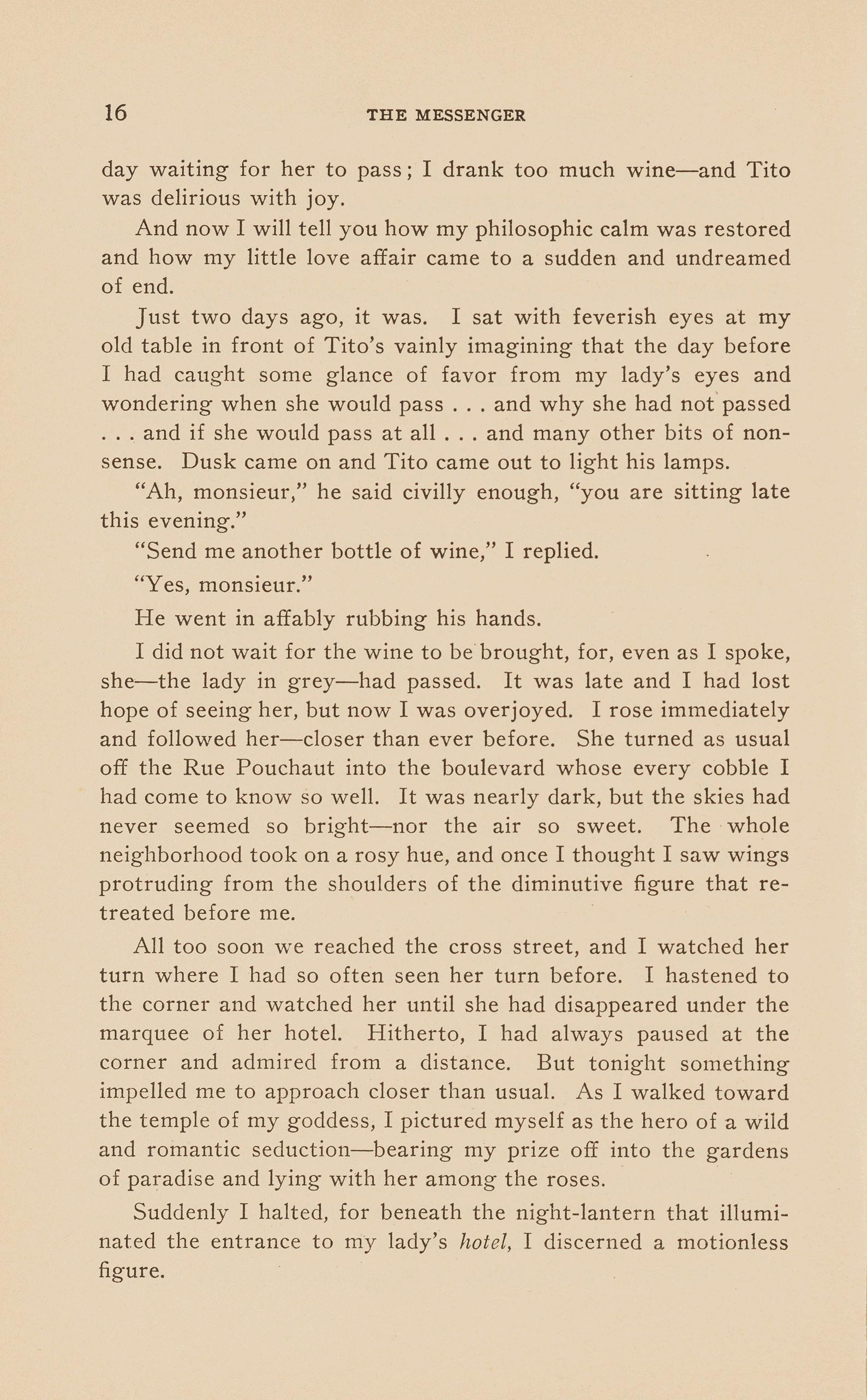
day waiting for her to pass; I drank too much wine-and Tito was delirious with joy.
And now I will tell you how my philosophic calm was restored and how my little love affair came to a sudden and undreamed of end.
Just two days ago, it was. I sat with feverish eyes at my old table in front of Tito's vainly imagining that the day before I had caught some glance of favor from my lady's eyes and wondering when she would pass ... and why she had not ' passed ... and if she would pass at all ... and many other bits of nonsense. Dusk came on and Tito came out to light his lamps.
"Ah, monsieur," he said civilly enough, "you are sitting late this evening."
"Send me another bottle of wine," I replied.
"Yes, monsieur."
He went in affably rubbing his hands.
I did not wait for the wine to be brought, for, even as I spoke, she-the lady in grey-had passed. It was late and I had lost hope of seeing her, but now I was overjoyed. I rose immediately and followed her-closer than ever before. She turned as usual off the Rue Pouchaut into the boulevard whose every cobble I had come to know so well. It was nearly dark, but the skies had never seemed so bright-nor the air so sweet. The whole neighborhood took on a rosy hue, and once I thought I saw wings protruding from the shoulders of the diminutive figure that retreated before me.
All too soon we reached the cross street, and I watched her turn where I had so often seen her turn before. I hastened to the corner and watched her until she had disappeared under the marquee of her hotel. Hitherto, I had always paused at the corner and admired from a distance. But tonight something impelled me to approach closer than usual. As I walked toward the temple of my goddess, I pictured myself as the hero of a wild and romantic seduction-bearing my prize off into the gardens of paradise and lying with her among the roses.
Suddenly I halted, for beneath the night-lantern that illuminated the entrance to my lady's hotel, I discerned a motionless figure.
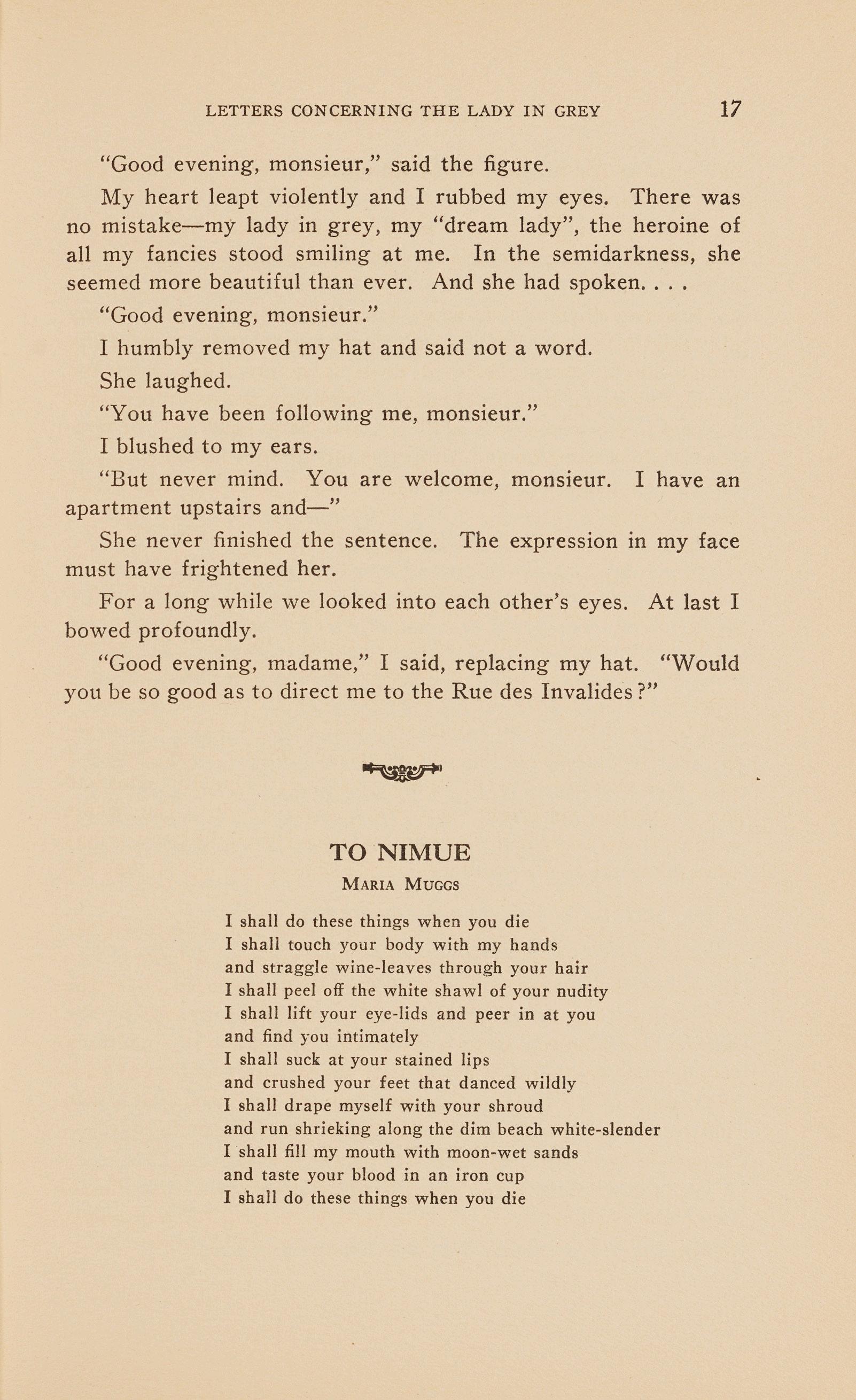
LETTERS CONCERNING THE LADY IN GREY 17
"Good evening, monsieur," said the figure. My heart leapt violently and I rubbed my eyes. There was no mistake-my lady in grey, my "dream lady", the heroine of all my fancies stood smiling at me. In the semidarkness, she seemed more beautiful than ever. And she had spoken ....
"Good evening, monsieur."
I humbly removed my hat and said not a word.
She laughed
"You have been following me, monsieur."
I blushed to my ears.
"But never mind. You are welcome, monsieur. I have an apartment upstairs and-"
She never finished the sentence. The expression in my face must have frightened her.
For a long while we looked into each other's eyes. At last I bowed profoundly.
"Good evening, madame," I said, replacing my hat. "Would you be so good as to direct me to the Rue des Invalides ?"
TO NIMUE
MARIA MUGGS
I shall do these things when you die I shall touch your body with my hands and straggle wine-leaves through your hair I shall peel off the white shawl of your nudity I shall lift your eye-lids and peer in at you and find you intimately I shall suck at your stained lips and crushed your feet that danced wildly I shall drape myself with your shroud and run shrieking along the dim beach white -slender I shall fill my mouth with moon-wet sands and taste your blood in an iron cup I shall do these things when you die
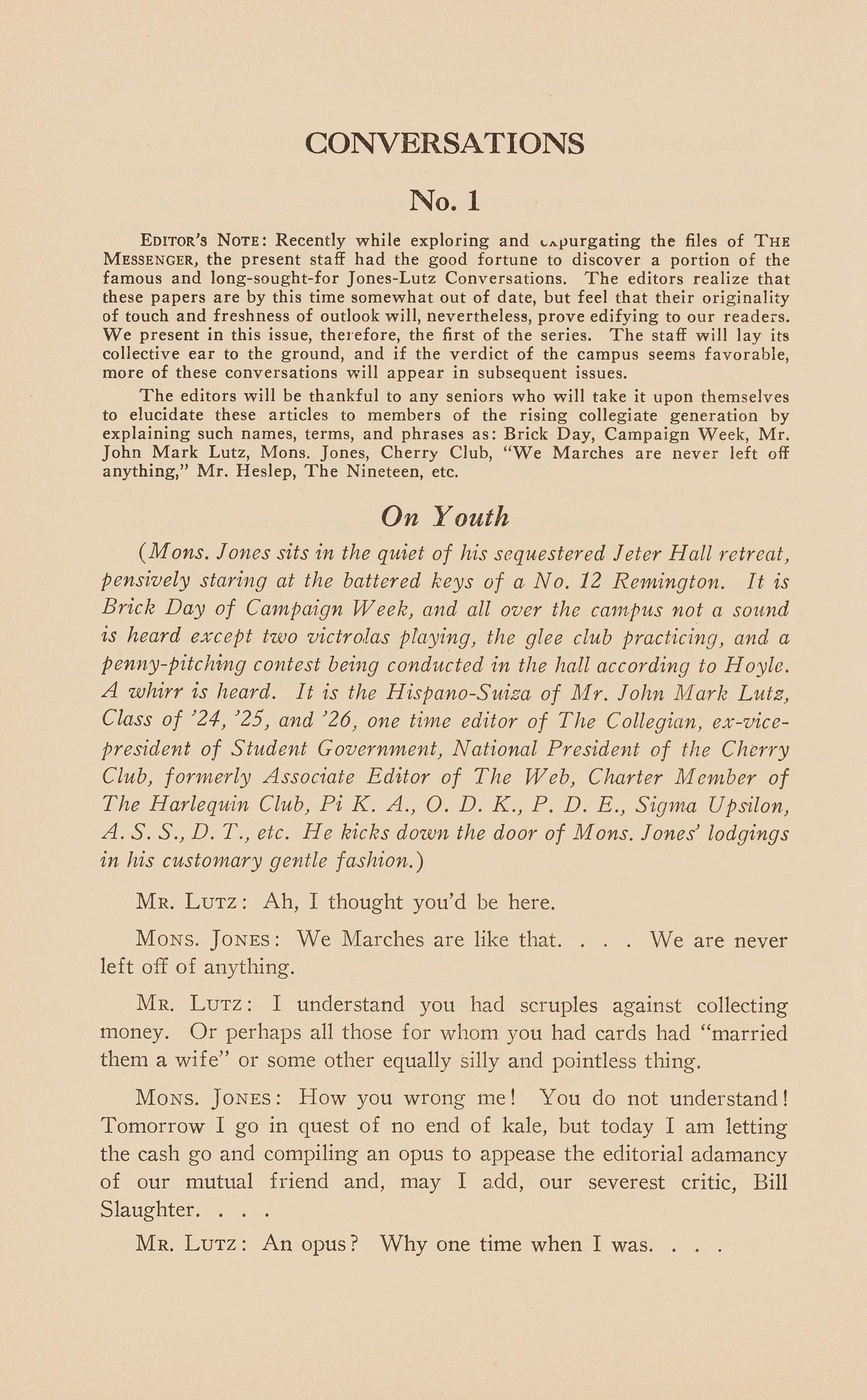
CONVERSATIONS
No.1
EDITOR'SNoTE: Recently while exploring and ,rnrgating the files of THE MESSENGER,the present staff had the good fortune to discover a portion of the famous and long-sought-for Jones-Lutz Conversations. The editors realize that these papers are by this time somewhat out of date, but feel that their originality of touch and freshness of outlook will, nevertheless, prove edifying to our readers. We present in this issue, therefore, the first of the series. The staff will lay its collective ear to the ground, and if the verdict of the campus seems favorable, more of these conversations will appear in subsequent issues.
The editors will be thankful to any seniors who will take it upon themselves to elucidate these articles to members of the rising collegiate generation by explaining such names, terms, and phrases as: Brick Day, Campaign Week, Mr. John Mark Lutz, Mons. Jones, Cherry Club, "We Marches are never left off anything," Mr. Heslep, The Nineteen, etc.
On Youth
(Mons. Jones sits in the quiet of his sequestered Jeter Hall retreat, pensively staring at the battered keys of a No. 12 Rem ,ington. It is Briel? Day of Campaign Week, and all over the ca11ipus not a sound is heard except two victro,las playing, the glee club practicing, and a penny-pitching contest being conducted in the hall according to Hoyle. A whirr is heard. It is the Hispano-Suiza of Mr. John Mar l? Lutz, Class of '24, '25, and '26, one time editor of The Collegian, ex-vicepresident of Student Government, National President of tlze Cherry Club, formerly Associate Editor of The Web, Charter Member of The Harlequin Club, Pi K. A., 0. D. K., P. D. E., Sigma Upsilon, A. S. S., D. T., etc. He kicks down the door of Mons. Jones' lodgings in his customary gentle fashion.)
MR. LuTZ: Ah, I thought you'd be here.
MoNs. JONES: We Marches are like that .... We are never left off of anything.
MR. LUTZ: I understand you had scruples against collecting money. Or perhaps all tho se for whom you had cards had "married them a wife" or some other equally silly and pointless thing.
MoNs. JONES: How you wrong me ! You do not understand ! Tomorrow I go in quest of no end of kale, but today I am letting the cash go and compiling an opus to appease the editorial adamancy of our mutual friend and, may I add, our severest critic, Bill Slaughter ...
MR. LuTZ: An opus? Why one time when I was. . . .
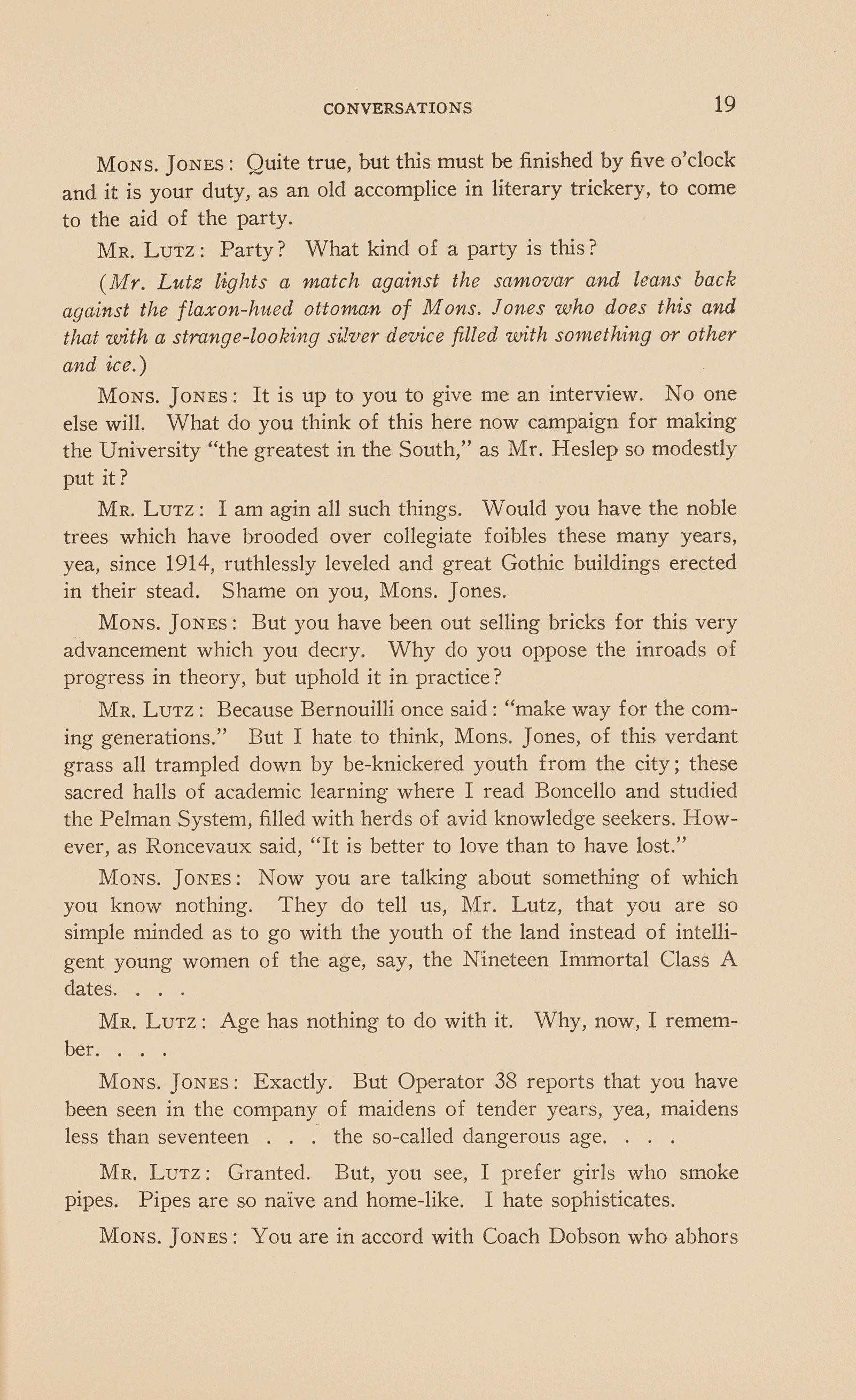
MoNs. JoNES: Quite true, but this must be finished by five o'clock and it is your duty, as an old accomplice in literary trickery, to come to the aid of the party.
MR. LUTZ: Party? What kind of a party is this?
(Mr. Lutz lights a match against the samovar and leans back against the flax on-hued ottonian of Mons. Jones who does this and that with a strange-looking silver device filled with something or other and ice.)
MoNs. JoNES: It is up to you to give me an interview. No one else will. What do you think of this here now campaign for making the University "the greatest in the South," as Mr. Heslep so modestly put it?
MR. LUTZ: I am agin all such things. Would you have the noble trees which have brooded over collegiate foibles these many years , yea, since 1914, ruthlessly leveled and great Gothic buildings erected in their stead. Shame on you, Mons. Jones.
MoNs. JONES: But you have been out selling bricks for this very advancement which you decry. Why do you oppose the inroad s of progress in theory, but uphold it in practice?
MR. LUTZ: Because Bernouilli once said: "make way for the coming generations." But I hate to think, Mons. Jones, of this verdant grass all trampled down by be-knickered youth from the city; these sacred halls of academic learning where I read Boncello and studied the Pelman System, filled with herds of avid knowledge seekers. However, as Roncevaux said, "It is better to love than to have lost."
MoNs. JONES: Now you are talking about something of which you know nothing. They do tell us, Mr. Lutz, that you are so simple minded as to go with the youth of the land instead of intelligent young women of the age, say, the Nineteen Immortal Class A dates. . .
MR. LUTZ : Age has nothing to do with it. Why, now, I remember ....
MoNs. JONES: Exactly But Operator 38 reports that you have been seen in the company of maidens of tender years, yea, maidens less than seventeen . . the so-called dangerous age. . . .
MR. LUTZ: Granted. But, you see, I prefer girl s who smoke pipes. Pipes are so naive and home-like. I hate sophisticates.
MoNs. JONES: You are in accord with Coach Dobson who abhors
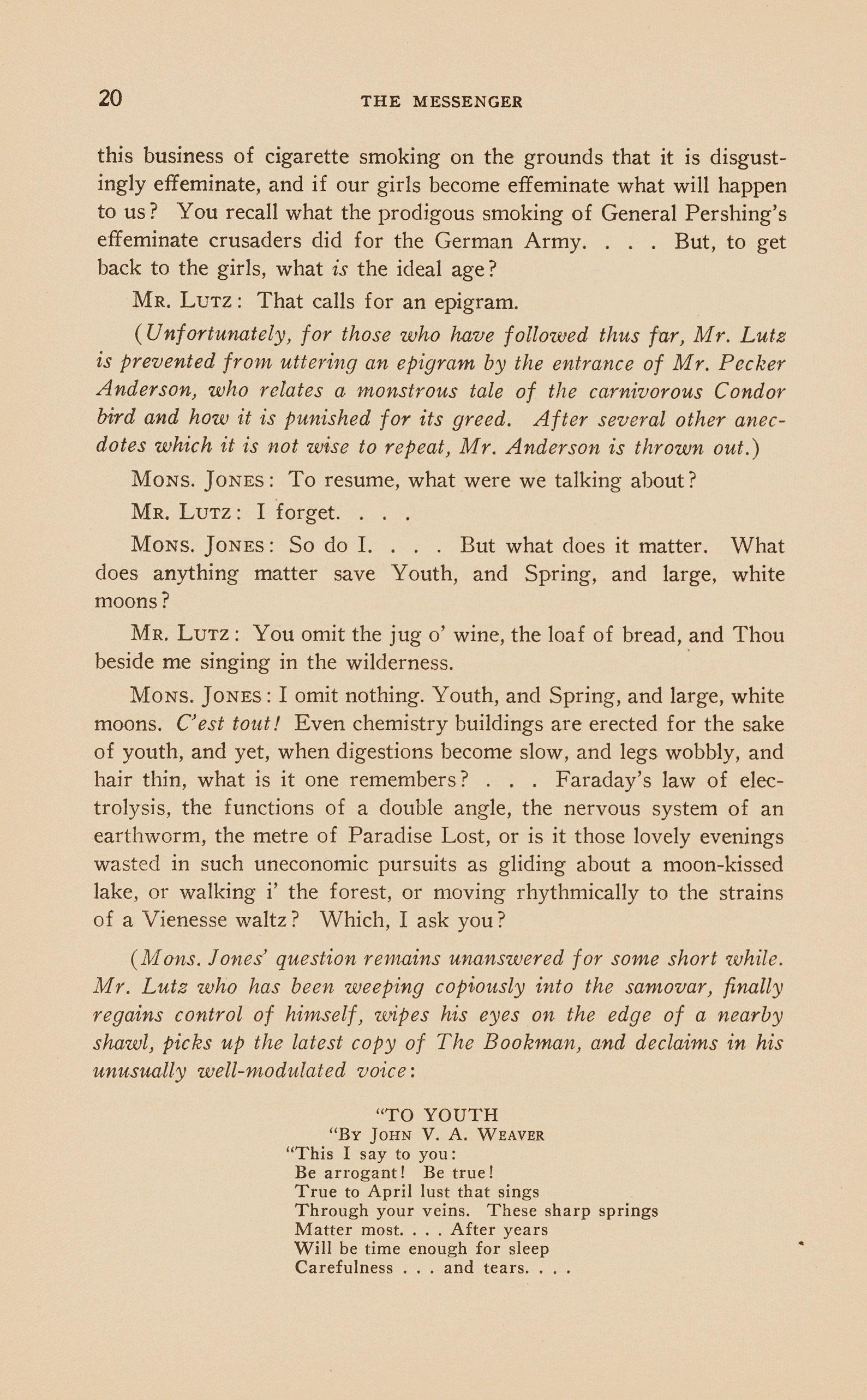
this business of cigarette smoking on the grounds that it is disgustingly effeminate, and if our girls become effeminate what will happen to us? You recall what the prodigous smoking of General Pershing's effeminate crusaders did for the German Army. . . . But, to get back to the girls, what is the ideal age?
MR. LUTZ: That calls for an epigram.
( Unfortunately, for those who have followed thus far, Mr. Lutz is prevented from uttering an epigram by the entrance of Mr. Pecker Anderson, who relates a monstrous tale of the carnivorous Condor bird and how it is punished for its greed. After several other anecdotes which it is not wise to repeat, Mr. Anderson is thrown out.)
MoNs. JONES: To resume, what were we talking about?
MR. LUTZ: I forget. . . .
MoNs. JONES: So do I. ... But what does it matter. What does anything matter save Youth, and Spring, and large, white moons?
MR. LuTz: You omit the jug o' wine, the loaf of bread, and Thou beside me singing in the wilderness. ·
MONS.JONES: I omit nothing Youth, and Spring, and large, white moons. C' est tout! Even chemistry buildings are erected for the sake of youth, and yet, when digestions become slow, and legs wobbly, and hair thin, what is it one remembers? . . . Faraday's law of electrolysis, the functions of a double angle, the nervous system of an earthworm, the metre of Paradise Lost, or is it those lovely evenings wast ed in such uneconomic pursuits as gliding about a moon-kissed lake, or walking i' the forest, or moving rhythmically to the strains of a Vienesse waltz? Which, I ask you?
(Mons. Jones' question remains unanswered for some short while. Mr. Lutz who has been weeping copiously into the samovar, finally regains control of himself, wipes his eyes on the edge of a nearby shawl, picks up the latest copy of The Bookman, and declaims in his unusually well-modulated voice:
"TO
YOUTH
"BY JOHN V. A. WEAVER
"This I say to you: Be arrogant! Be true! True to April lust that sings Through your veins. These sharp springs Matter most .. .. After years Will be time enough for sleep Carefulness and tears ....
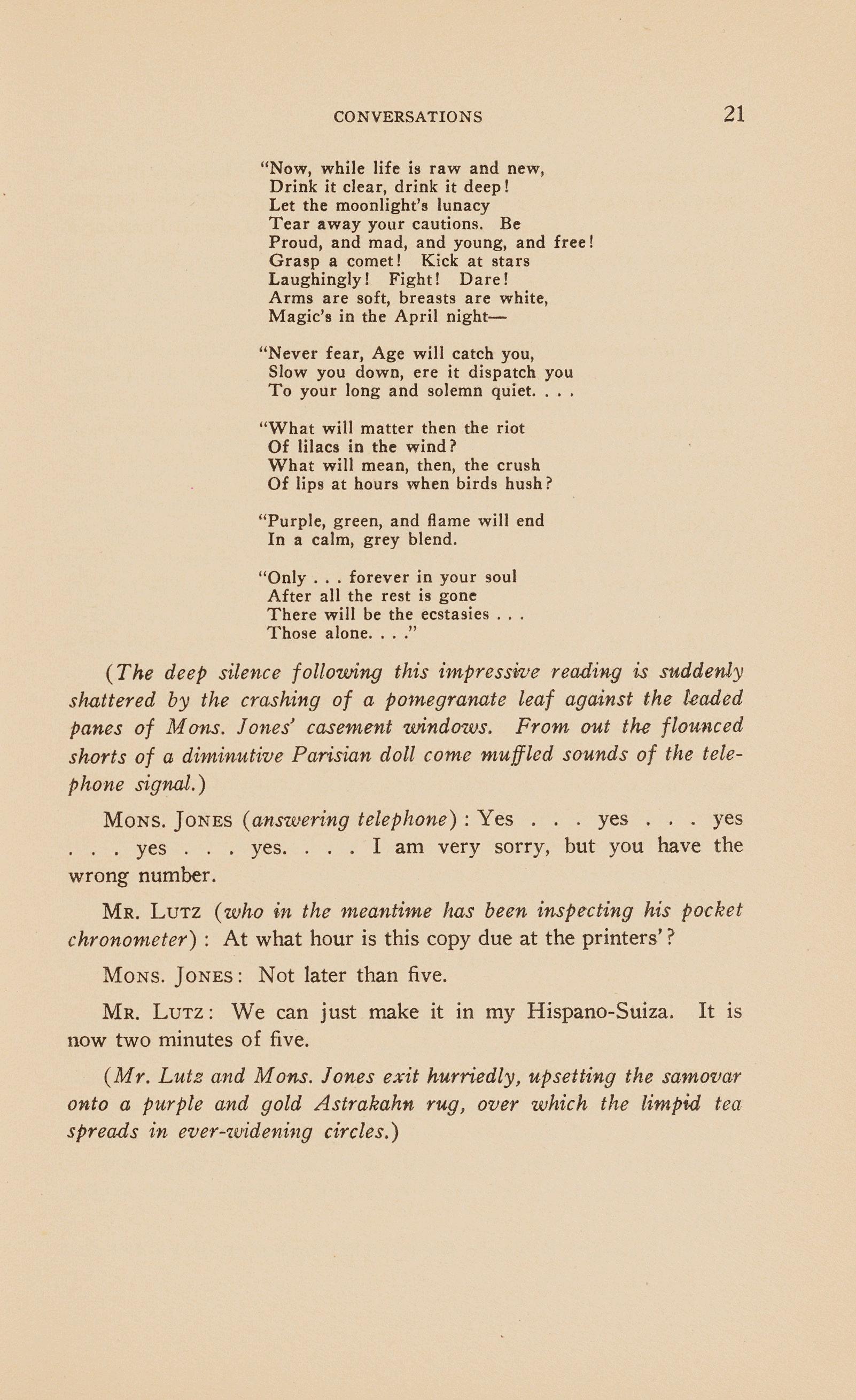
CONVERSATIONS
"Now, while life is raw and new, Drink it clear, drink it deep! Let the moonlight's lunacy Tear away your cautions. Be Proud, and mad, and young, and free! Grasp a comet! Kick at stars Laughingly! Fight! Dare! Arms are soft, breasts are white, Magic's in the April night-
"Never fear, Age will catch you, Slow you down, ere it dispatch you To your long and solemn quiet
"What will matter then the riot Of lilacs in the wind? What will mean, then, the crush Of lips at hours when birds hush?
"Purple, green, and flame will end In a calm, grey blend.
"Only ... forever in your soul After all the rest is gone There will be the ecstasies . Those alone "
( The deep silence following this inipressive reading is suddenJ,y shattered by the crashing of a pomegranate leaf against the leaded panes of Mons. Jones' casement windows. From out the flounced shorts of a diminutive Parisian doll come muffled sounds of the telephone signal.)
MONS. JONES (answering telephone): Yes ... yes ... yes . . . yes . . . yes. . I am very sorry, but you have the wrong number.
MR. LuTZ ( who in the meantime has been inspecting his pocket chronometer) : At what hour is this copy due at the printers'?
MoNs. JONES: Not later than five.
MR. LuTz: We can just make it in my Hispano-Suiza. It 1s now two minutes of five.
(Mr. Lutz and Mons. Jones exit hurriedly, upsetting the samovar onto a purple and gold Astrakahn rug, over which the limpid tea spreads in ever-widening circles.)

VETILLE: ALLEGRETTO
BRUCE MORRISSETTE
THE Bishop of Villeneuve knelt softly before the tiny crucifix. As you peered through the trembling lamplight about the priest you saw the great dim stained windows draped curtainlike over a massive stillness veined with the thin pipes of a medieval organ, and near you the ancient pews rustled furtively and intimately, like the fingers of old men.
"And yet," observed the Bishop of Villeneuve, "I must confess to a regrettable lack of proper repentant sentiment."
For at about the middle of the previous afternoon, while occupied in performing the innumerous duties attendant upon the office of bishop, the young cleric, passing at adventure through the precints of his diocese, had fallen, as he now reflected, into grave error. Having put off, in the heat of the day, his capacious robe and the other more obvious insignia of his theological capacity, he then presented the appearance by and large of a footloose tall rogue journeying at chance upon the public highway.
So it was, that stopping momentarily to procure a drink from a merry spring he encountered beside the road, the whim seized him, upon questionings as to the possible extent of his travellings timidly put to him by a not wholly unpersonable wench who set aside a bucket of water and approached him, to contrive, idly enough, stories of high deeds in colorful warm lands a pleasant long way from the rather hackneyed surroundings at hand. And he carried it off, the good bishop had to concede to himself, to a nicety.
"But, messire," the girl had asked, "how does it happen that you, who really have your choice of any of these fine lands to travel through, and who can visit the far courts of emperors and kings and caliphs and sultans to compete for the hands of princesses, with the whole world like a bright showing at your disposal, are content to remain hereabouts? Surely now, in India, where they tell are spices and tapestries and shining stuffs-"
At this point, however, the good bishop had informed her that
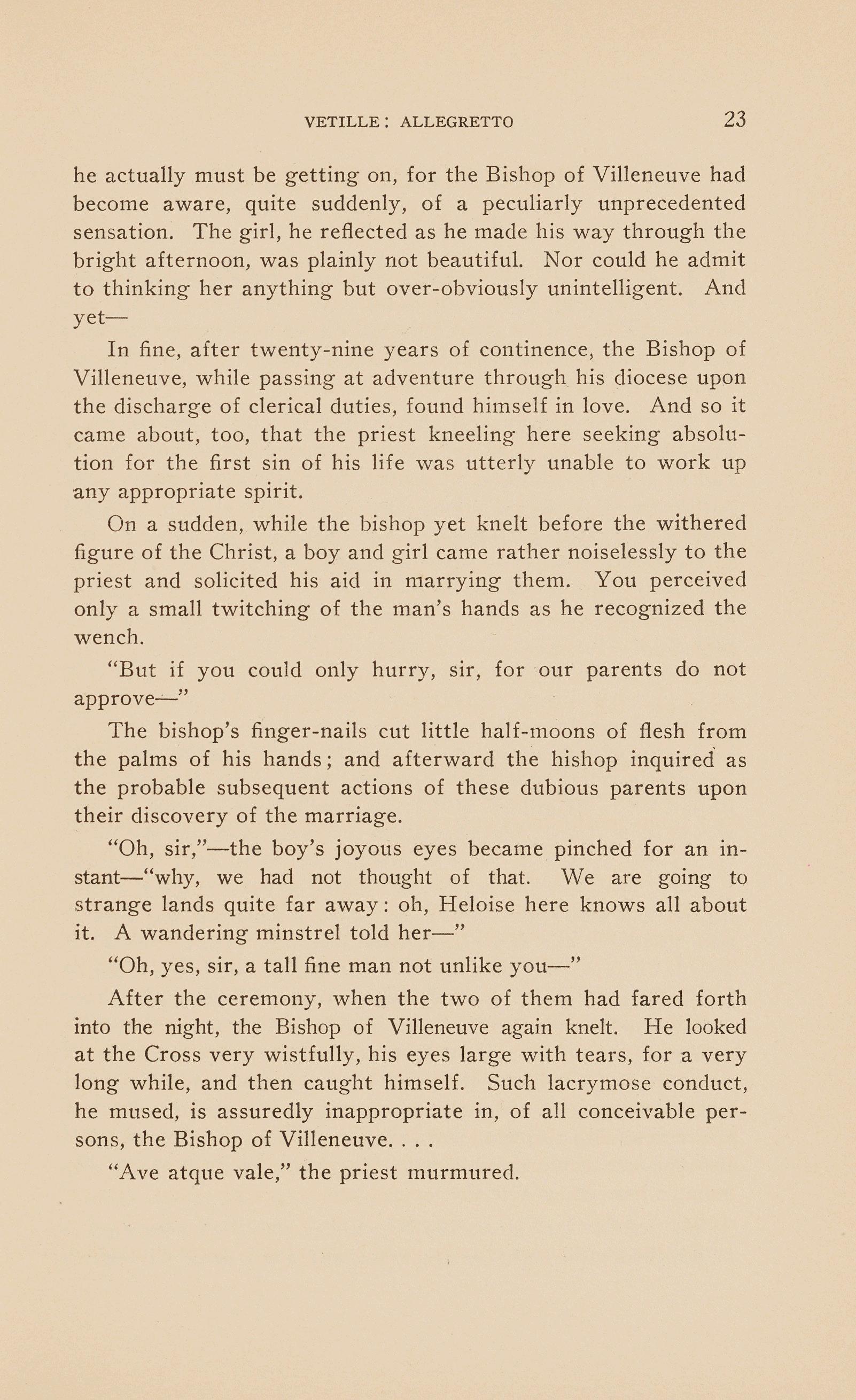
VETILLE: ALLEGRETTO
he actually must be getting on, for the Bishop of Villeneuve had become aware, quite suddenly, of a peculiarly unprecedented sensation. The girl, he reflected as he made his way through the bright afternoon, was plainly not beautiful. Nor could he admit to thinking her anything but over-obviously unintelligent. And yet-
In fine, after twenty-nine years of continence, the Bishop of Villeneuve, while passing at adventure through his diocese upon the discharge of clerical duties, found himself in love. And so it came about, too, that the priest kneeling here seeking absolution for the first sin of his life was utterly unable to work up any appropriate spirit.
On a sudden, while the bishop yet knelt before the withered figure of the Christ, a boy and girl came rather noiselessly to the priest and solicited his aid in marrying them. You perceived only a small twitching of the man's hands as he recognized the wench.
"But if you could only hurry, sir, for our parents do not approve~"
The bishop's finger-nails cut little half-moons of flesh from the palms of his hands; and afterward the hishop inquired° as the probable subsequent actions of these dubious parents upon their discovery of the marriage.
"Oh, sir,"-the boy's joyous eyes became pinched for an instant-"why, we had not thought of that. We are going to strange lands quite far away: oh, Heloise here knows all about it. A wandering minstrel told her-"
"Oh, yes, sir, a tall fine man not unlike you-"
After the ceremony, when the two of them had fared forth into the night, the Bishop of Villeneuve again knelt. He looked at the Cross very wistfully, his eyes large with tears, for a very long while, and then caught himself. Such lacrymose conduct, he mused, is assuredly inappropriate in, of all conceivable persons, the Bishop of Villeneuve ....
"Ave atque vale," the priest murmured.
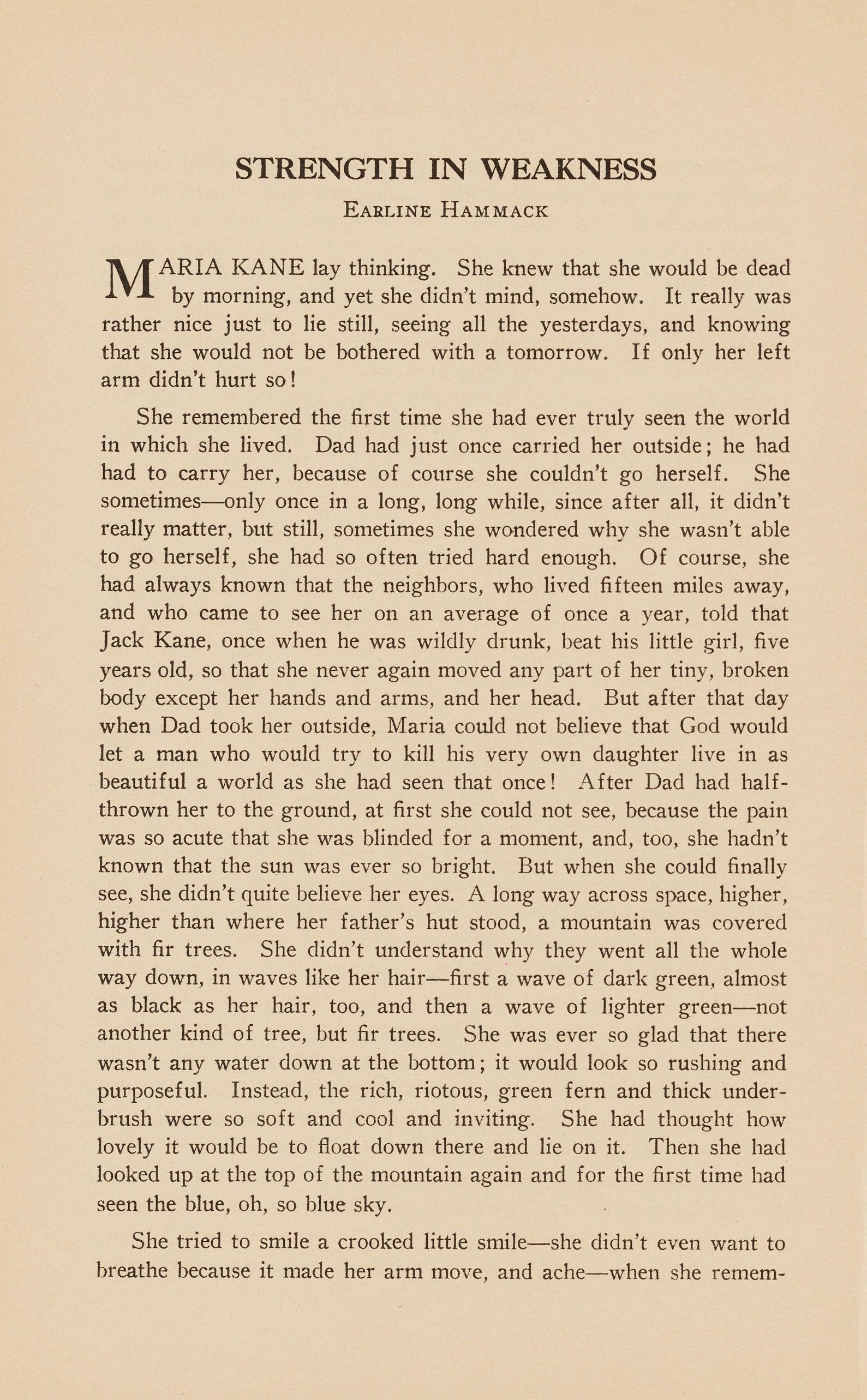
STRENGTH IN WEAKNESS
EARLINE HAMMACK
M ARIA KANE lay thinking. She knew that she would be dead by morning, and yet she didn't mind, somehow. It really was rather nice just to lie still, seeing all the yesterdays, and knowing that she would not be bothered with a tomorrow. If only her left arm didn't hurt so !
She remembered the first time she had ever truly seen the world in which she lived. Dad had just once carried her outside; he had had to carry her, because of course she couldn't go herself. She sometimes-only once in a long, long while, since after all , it didn't really matter, but still, sometimes she wondered why she wasn't able to go herself, she had so often tried hard enough. Of course, she had always known that the neighbors, who lived fifteen miles away, and who came to see her on an average of once a year, told that Jack Kane, once when he was wildly drunk , beat his little girl , five years old, so that she never again moved any part of her tiny, broken body except her hands and arms, and her head. But after that day when Dad took her outside, Maria could not believe that God would let a man who would try to kill his very own daughter live in as beautiful a world as she had seen that once! After Dad had halfthrown her to the ground, at first she could not see, because the pain was so acute that she was blinded for a moment, and, too, she hadn't known that the sun was ever so bright . But when she could finally see, she didn't quite believe her eyes. A long way across space, higher, higher than where her father's hut stood, a mountain was covered with fir trees. She didn't understand why they went all the whole way down, in waves like her hair-first a wave of dark green, almost as black as her hair, too, and then a wave of lighter green-not another kind of tree, but fir trees. She was ever so glad that there wasn't any water down at the bottom; it would look so rushing and purposeful. Instead, the rich, riotous, green fern and thick underbrush were so soft and cool and inviting. She had thought how lovely it would be to float down there and lie on it. Then she had looked up at the top of the mountain again and for the first time had seen the blue, oh, so blue sky.
She tried to smile a crooked little smile-she didn ' t even want to breathe because it made her arm move, and ache-when she remem-
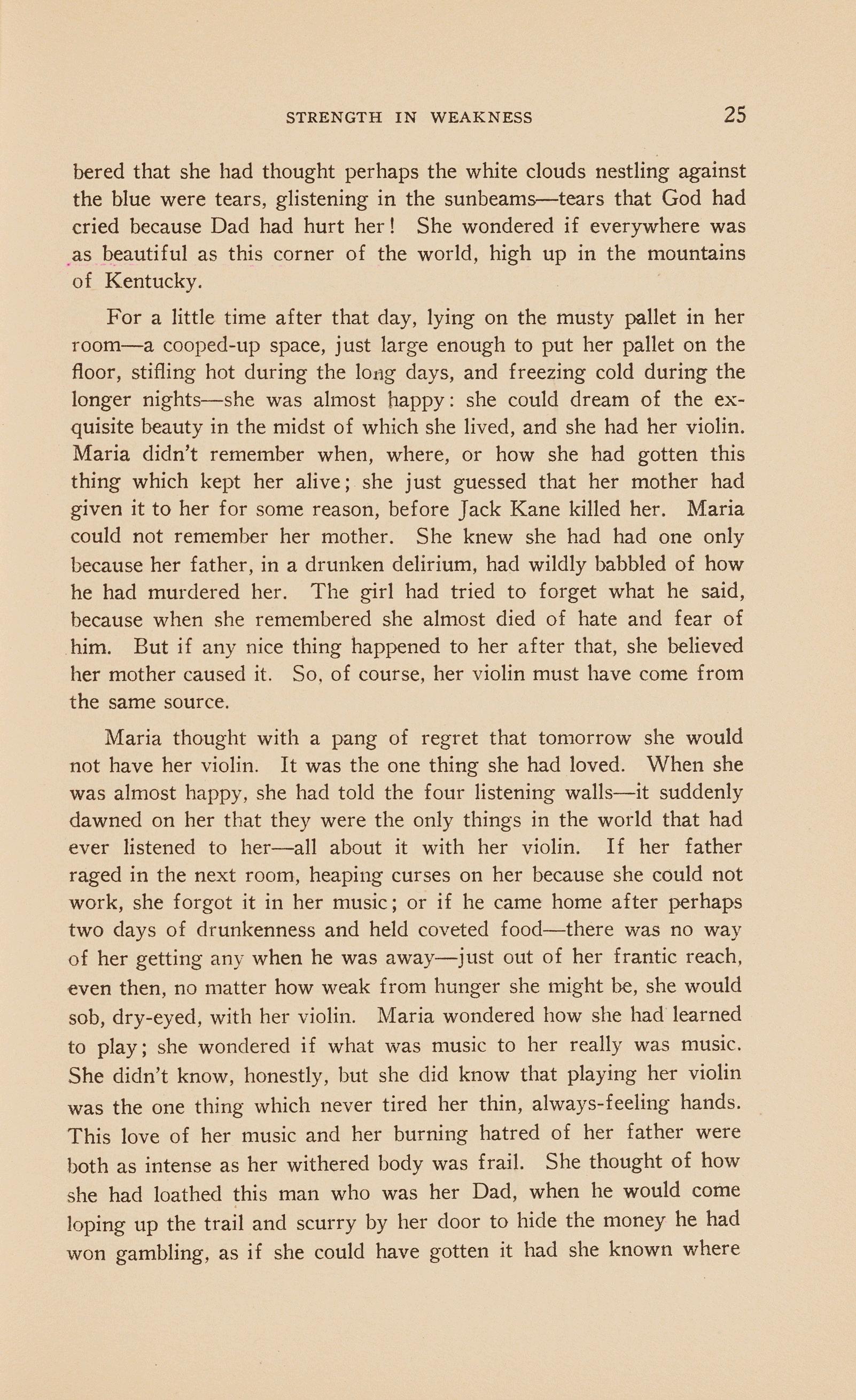
bered that she had thought perhaps the white clouds nestling against the blue were tears, glistening in the sunbeams-tears that God had cried because Dad had hurt her! She wondered if everywhere was as beautiful as this corner of the world, high up in the mountains of Kentucky.
For a little time after that day, lying on the musty pallet in her room-a cooped-up space, just large enough to put her pallet on the floor, stifling hot during the 1011gdays, and freezing cold during the longer nights-she was almost happy: she could dream of the exquisite beauty in the midst of which she lived, and she had her violin. Maria didn't remember when, where, or how she had gotten this thing which kept her alive; she just guessed that her mother had given it to her for some reason, before Jack Kane killed her. Maria could not remember her mother. She knew she had had one only because her father, in a drunken delirium, had wildly babbled of how he had murdered her. The girl had tried to forget what he said, because when she remembered she almost died of hate and fear of him. But if any nice thing happened to her after that, she believed her mother caused it. So , of course, her violin must have come from the same source.
Maria thought with a pang of regret that tomorrow she would not have her violin . It was the one thing she had loved. When she was almost happy, she had told the four listening walls-it suddenly dawned on her that they were the only things in the world that had ever listened to her-all about it with her violin. If her father raged in the next room, heaping curses on her because she could not work, she forgot it in her music; or if he came home after perhaps two days of drunkenness and held coveted food-there was no way of her getting any when he was away-just out of her frantic reach, even then, no matter how weak from hunger she might be, she would sob, dry-eyed, with her violin. Maria wondered how she had learned to play; she wondered if what was music to her really was music. She didn't know, honestly, but she did know that playing her violin was the one thing which never tired her thin, always-feeling hands. This love of her music and her burning hatred of her father were both as intense as her withered body was frail. She thought of how she had loathed this man who was her Dad, when he would come loping up the trail and scurry by her door to hide the money he had won gambling, as if she could have gotten it had she known where
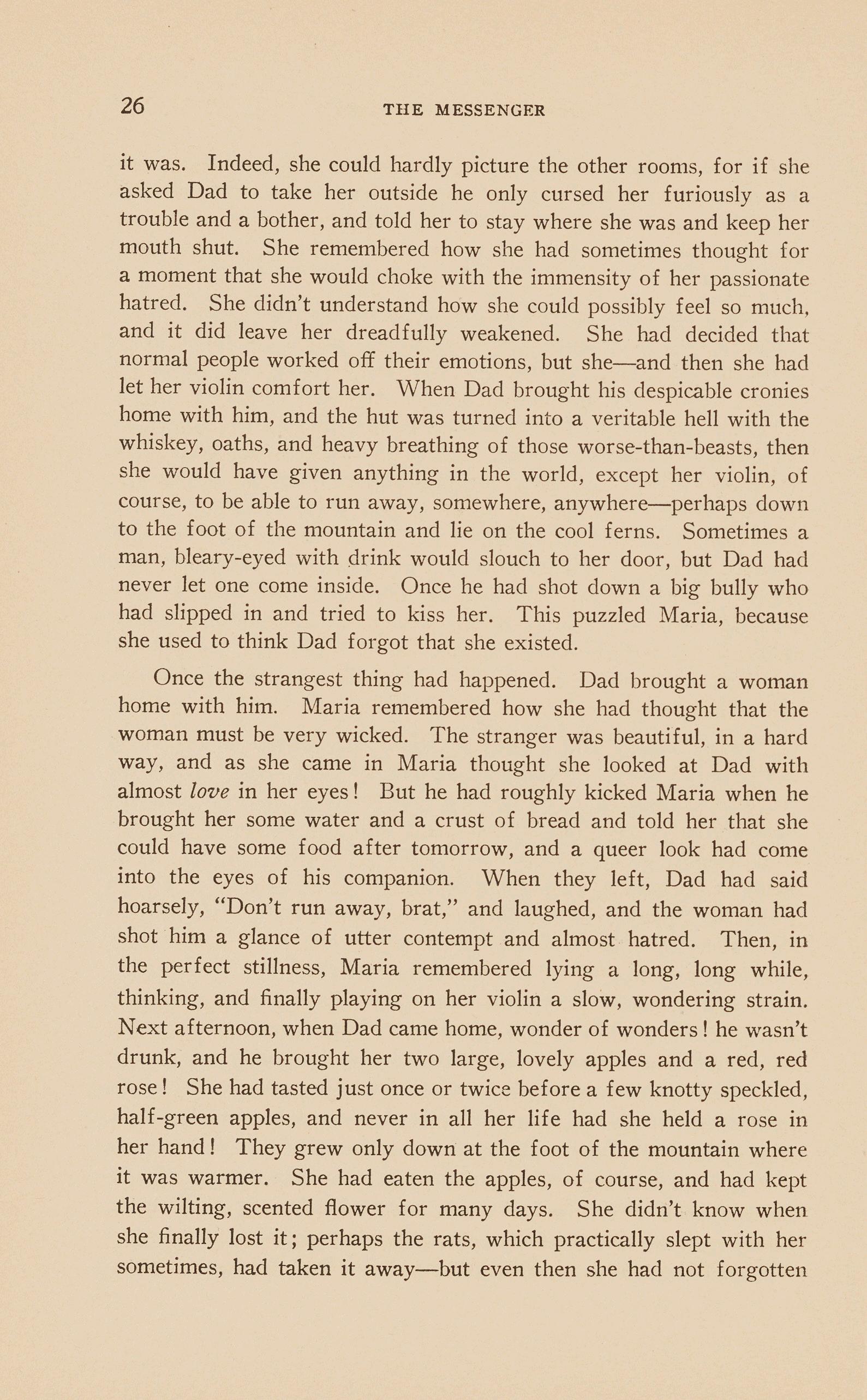
it was. Indeed, she could hardly picture the other rooms, for if she asked Dad to take her outside he only cursed her furiously as a trouble and a bother, and told her to stay where she was and keep her mouth shut. She remembered how she had sometimes thought for a moment that she would choke with the immensity of her passionate hatred. She didn't understand how she could possibly feel so much, and it did leave her dreadfully weakened. She had decided that normal people worked off their emotions, but she-and then she had let her violin comfort her. When Dad brought his despicable cronies home with him, and the hut was turned into a veritable hell with the whiskey, oaths, and heavy breathing of those worse-than-beasts, then she would have given anything in the world, except her violin, of course, to be able to run away, somewhere, anywhere-perhaps down to the foot of the mountain and lie on the cool ferns. Sometimes a man, bleary-eyed with drink would slouch to her door, but Dad had never let one come inside. Once he had shot down a big bully who had slipped in and tried to kiss her. This puzzled Maria, because she used to think Dad forgot that she existed.
Once the strangest thing had happened. Dad brought a woman home with him. Maria remembered how she had thought that the woman must be very wicked. The stranger was beautiful, in a hard way, and as she came in Maria thought she looked at Dad with almost love in her eyes ! But he had roughly kicked Maria when he brought her some water and a crust of bread and told her that she could have some food after tomorrow, and a queer look had come into the eyes of his companion. When they left, Dad had said hoarsely, "Don't run away, brat," and laughed, and the woman had shot him a glance of utter contempt and almost hatred. Then, in the perfect stillness, Maria remembered lying a long, long while, thinking, and finally playing on her violin a slow, wondering strain. Next afternoon, when Dad came home, wonder of wonders! he wasn't drunk, and he brought her two large, lovely apples and a red, red rose! She had tasted just once or twice before a few knotty speckled, half-green apples, and never in all her life had she held a rose in her hand ! They grew only down at the foot of the mountain where it was warmer. She had eaten the apples, of course, and had kept the wilting, scented flower for many days. She didn't know when she finally lost it; perhaps the rats, which practically slept with her sometimes, had taken it away-but even then she had not forgotten

it, for the song her violin sang of her red, red rose, she thought was the most exquisite music she had ever heard.
Maria, half-dreaming, decided that this was the second time in her life she had been almost happy. And then she thought of the third time, and in her imagination nodded her head because she knewnow-why she did what she had just done.
The third time! It took her breath away even yet, and it happened three, long years ago, when she was only ten. It had been just one week after the "wicked woman" came home with Dad. Dad had been drunk only twice that whole week, and when he came in early that Friday morning he had a bundle-whiskey she supposed. Maria remembered how her heart sank, because when he drank at the hut Dad was always more fiendish than when he came in drunk. But this morning he walked; he didn't lope, and he didn't scurry ; in fact, for once he seemed to be a man, rather than an animal, and he came into her room, gave her the bundle, and kissed her! Maria had never known him to do that before, and he never did it again. She mechanically reached for her violin, and felt the bundle, which her surprise made her forget. After torturing attempts, both because of the pain in her fingers, and because they were so exasperatingly slow and helpless, she succeeded at last in opening the package and found a dress !
Maria lived over completely that moment !
For a long, long time she was afraid to touch it, for fear that it would vanish; it couldn't be real; it must be a dream. But just the same, she forgot everything while she gazed at it. She decided that it must be a piece of the sky she had seen that once, because it was of the bluest blue, and had the puffs of white clouds sprinkled on it. That meant that of course Mother had sent it.
In the dark, a serious, intent look came over Maria's face, drawn with pain. She must be sure to thank Mother when she saw her tomorrow. She mustn't forget.
Finally, she had tremblingly touched the piece of sky, and instinct told her that it was lovely satin. Of course, she could have never worn the dress, even if she could have endured the agony of putting it on, the idea of actually wearing it, as she had always worn the shapeless sacks Dad brought her, was not to be thought of for a moment. So after that she had always had the sky right by her bed, and she didn't worry any more because her room had no windows.
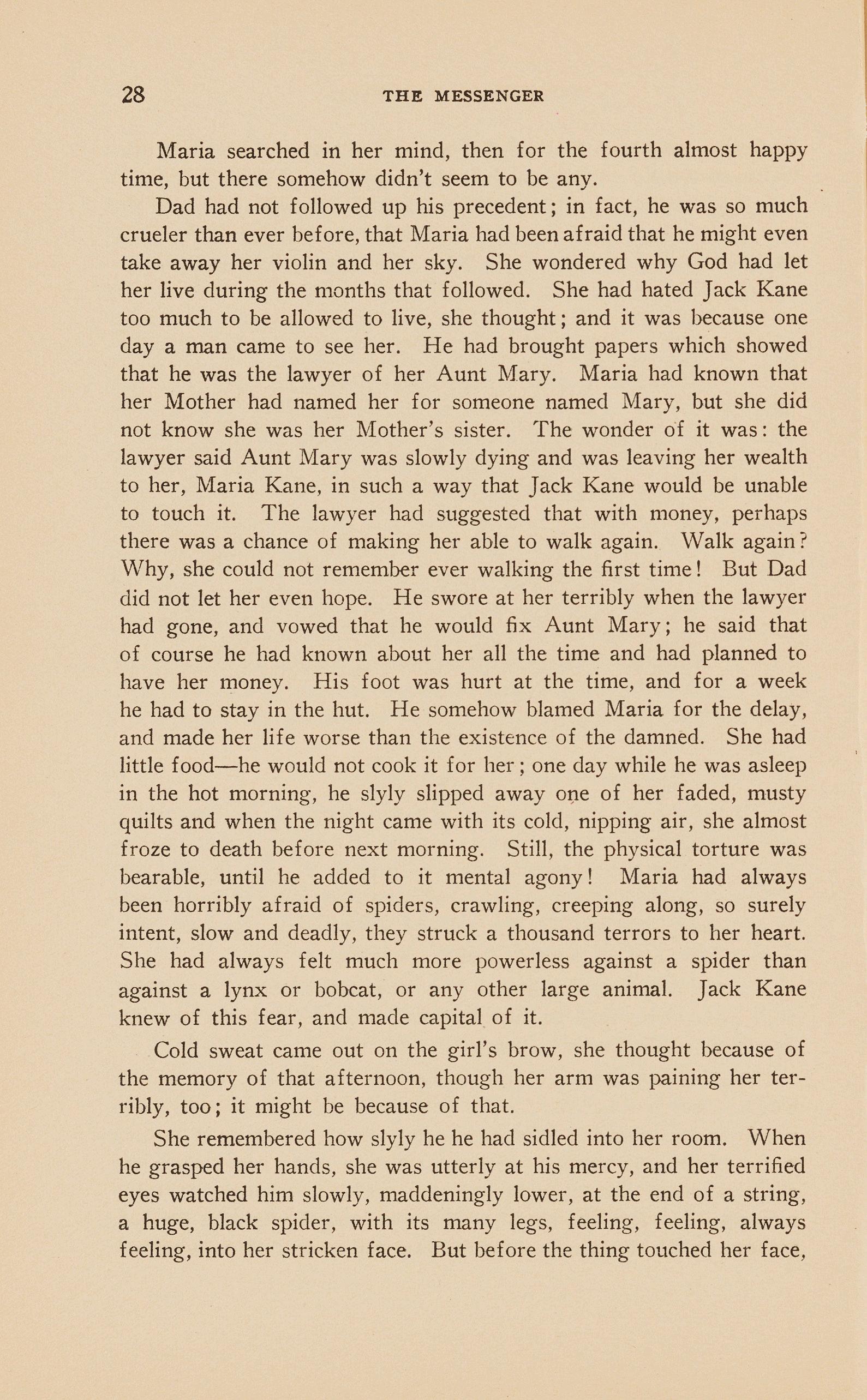
Maria searched in her mind, then for the fourth almost happy time, but there somehow didn't seem to be any.
Dad had not followed up his precedent; in fact, he was so much crueler than ever before, that Maria had been afraid that he might even take away her violin and her sky. She wondered why God had let her live during the months that followed. She had hated Jack Kane too much to be allowed to live, she thought ; and it was because one day a man came to see her. He had brought papers which showed that he was the lawyer of her Aunt Mary. Maria had known that her Mother had named her for someone named Mary , but she did not know she was her Mother's sister. The wonder o'f it was: the lawyer said Aunt Mary was slowly dying and was leaving her wealth to her, Maria Kane , in such a way that Jack Kane would be unable to touch it. The lawyer had suggested that with money, perhaps there was a chance of making her able to walk again. Walk again? Why, she could not remember ever walking the first time! But Dad did not let her even hope. He swore at her terribly when the lawyer had gone, and vowed that he would fix Aunt Mary; he said that of course he had known about her all the time and had planned to have her money . His foot was hurt at the time, and for a week he had to stay in the hut. He somehow blamed Maria for the delay, and made her life worse than the existence of the damned. She had little food-he would not cook it for her; one day while he was asleep in the hot morning, he slyly slipped away ot;ie of her faded, musty quilts and when the night came with its cold, nipping air, she almost froze to death before next morning . Still, the physical torture was bearable, until he added to it mental agony ! Maria had always been horribly afraid of spiders, crawling, creeping along, so surely intent, slow and deadly , they struck a thousand terrors to her heart. She had always felt much more powerless against a spider than against a lynx or bobcat, or any other large animal. Jack Kane knew of this fear, and made capital of it.
Cold sweat came out on the girl's brow, she thought because of the memory of that afternoon, though her arm was paining her terribly, too; it might be because of that.
She remembered how slyly he he had sidled into her room. When he grasped her hands, she was utterly at his mercy, and her terrified eyes watched him slowly, maddeningly lower, at the end of a string, a huge, black spider, with its many legs, feeling, feeling, always feeling, into her stricken face. But before the thing touched her face ,

because of weakness, terror, and agony, both mental and physical, she had mercifully fainted. After she had slowly regained consciousness, she remembered her shuddering feeling of utter relief when she found a bit of food by the side of her bed, and Dad gone. She knew that he had gone to Aunt Mary.
Maria thought of how often, in the next endless round of hoursshe had been unable to keep count of how many days it was-she had played her violin. She never seemed to stop. Her arms and hands never tired, and that puzzled her ; she could not do anything else with them; they were so weak. But she could always play her violin; and as she played in a wild, minor key, her consuming hatred, -surely, deadly, everlastingly,-grew. She had known that when Dad came back he would have Aunt Mary's money.
He came, late one night, with his liquor under his arm, and said coarsely, "You are a rich man's daughter, old girl." At that moment, Maria Kane would gladly have choked her own father , till his tongue lolled from his mouth and his eyes popped from their sockets, if Goel had given her the strength! After that one sentence, which for her made hell heaven in comparison with life in the world, the animal which was supposed to be her father drank the liquor in sloppy gulps until he sank to the floor in a drunken stupor from which she knew he would not awaken in the next twenty-four hours at least. Her violin had clone its best to comfort her, but she could play only in a dull , monotonous, stunned tone , and there was no music in it.
Maria remembered the following months rather vaguely . Every night or two Dad had come home dead drunk, to fall at once into a deep sleep , hi s breath sometimes coming in wheezing gasps. He never really saw her , and she didn't understand why he never failed to remember to bring her food when he cooked. That wasn't very often, of course , but she had had so little food lately, she hardly wanted any anymore. She decided there in the dark that she must have lived off the music of her violin and her sky.
But there had been one night when Dad had noticed her, hadn't there? The rain had been pattering and dancing so lightly and daintily on the roof that she had begun playing a gay, singing air, and Dad had slouched in, bleary-eyed, and wild, at that moment. He had in his hand a long, shining knife, and impulsively stood listening to the happy tune. But something must have infuriated him, and he lurched toward Maria's door, with the knife upraised . She wondered
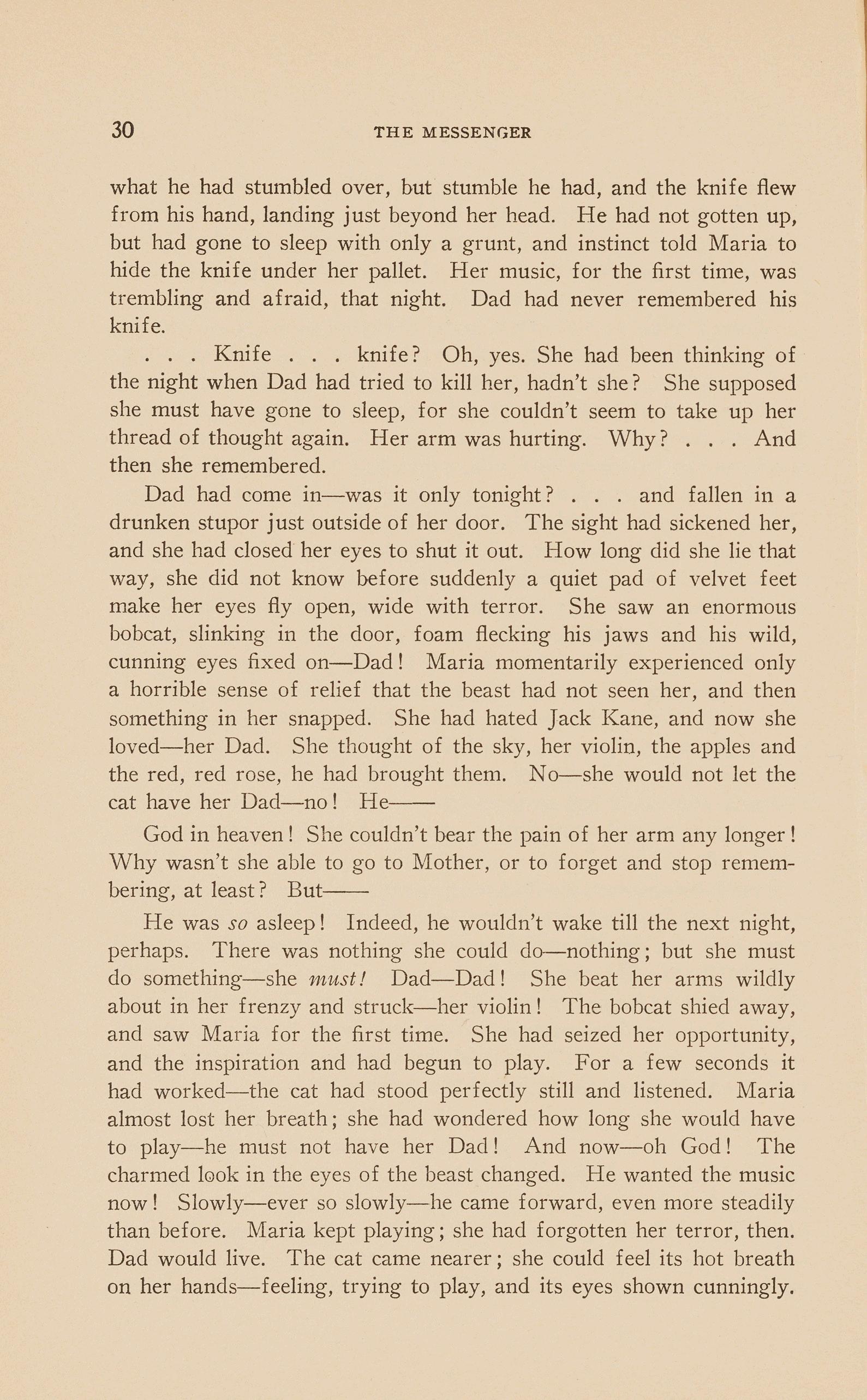
what he had stumbled over, but stumble he had, and the knife flew from his hand, landing just beyond her head. He had not gotten up, but had gone to sleep with only a grunt, and instinct told Maria to hide the knife under her pallet. Her music, for the first time, was trembling and afraid, that night. Dad had never remembered his knife . . . . Knife ... knife? Oh, yes. She had been thinking of the night when Dad had tried to kill her, hadn't she? She supposed she must have gone to sleep, for she couldn't seem to take up her thread of thought again. Her arm was hurting Why? . . . And then she remembered.
Dad had come in-was it only tonight? . . . and fallen in a drunken stupor just outside of her door. The sight had sickened her, and she had closed her eyes to shut it out. How long did she lie that way, she did not know before suddenly a quiet pad of velvet feet make her eyes fly open, wide with terror. She saw an enormous bobcat, slinking in the door, foam flecking his jaws and his wild, cunning eyes fixed on-Dad! Maria momentarily experienced only a horrible sense of relief that the beast had not seen her, and then something in her snapped. She had hated Jack Kane, and now she loved-her Dad . She thought of the sky, her violin, the apples and the red, red ro se , he had brought them. No-she would not let the cat have her Dad-no ! He--
God in heaven! She couldn ' t bear the pain of her arm any longer! Why wasn ' t she able to go to Mother , or to forget and stop remembering, at least? But--
He was so asleep! Indeed, he wouldn't wake till the next night, perhaps. There was nothing she could do-nothing; but she must do something- she must! Dad-Dad! She beat her arms wildly about in her frenzy and struck-her violin! The bobcat shied away , and saw Ma r ia for the first time. She had seized her opportunity, and the inspiration and had begun to play . For a few seconds it had worked-the cat had stood perfectly still and listened. Maria almost lost her breath; she had wondered how long she would have to play-he mu st not ha v e her Dad ! And now-oh God ! The charmed look in the eye s of the beast changed. He wanted the music now! Slowly-ever so slowly-he came forward, even more steadily than before. Maria kept playing; she had forgotten her terror, then. Dad would live. The cat came nearer ; she could feel its hot breath on her hands-feeling, trying to play, and its eyes shown cunningly.
STRENGTH IN WEAKNESS
Marie had seen it about to happen : right above her Maria had seen the beast leap high in the air and come down on the beloved violin. But one huge paw, with its hideous, tearing claws, had slipped through -through her soft bosom, down to her heart, and over her arm! For the second time in her life she had fainted. When she woke again, covered in her own blood, she had been a little puzzled over why the cat had gone. But she had looked across at Dad-and he was safe.
She looked at him now-he was still asleep, of course; drunk, yes, but that didn't matter. Why, he was suddenly slowly fading away"Da - - !" But it was so hard to breathe-she thought she would rest a minute--
"Mother ! . . . Thank you for my sky, Mother mine!"
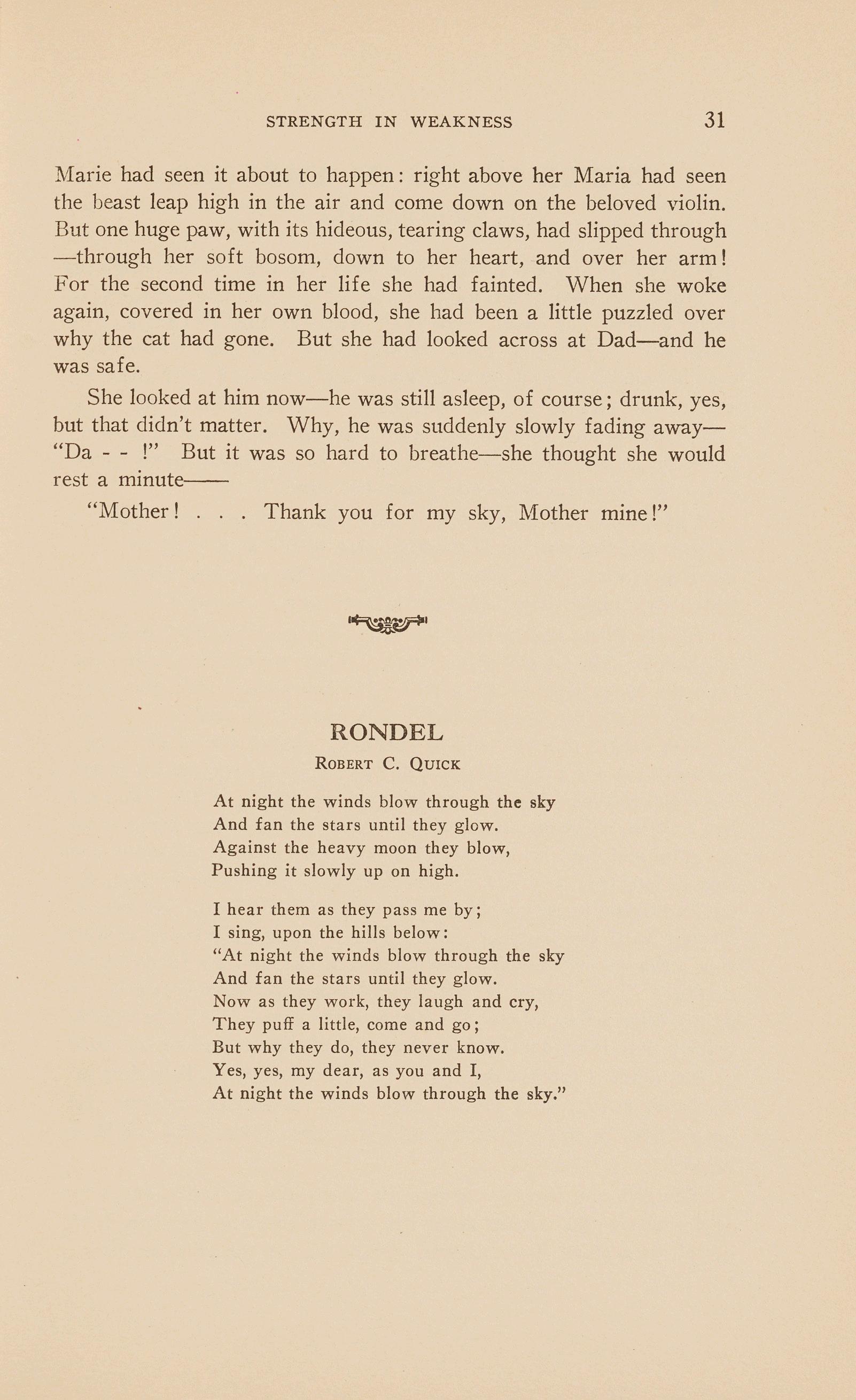
RONDEL
ROBERT C. QUICK
At night the winds blow through the sky And fan the stars until they glow. Against the heavy moon they blow, Pushing it slowly up on high.
I hear them as they pass me by; I sing, upon the hills below: "At night the winds blow through the sky And fan the stars until they glow. Now as they work, they laugh and cry, They puff a little, come and go; But why they do, they never know. Yes, yes, my dear, as you and I, At night the winds blow through the sky."

THREE HOURS OF DARKNESS
JOHNNIE ADAMS
PILATE got up and hastily went down the steps of the judgment hall. A slave girl drew back the heavy curtain, and waited for Pilate to enter the room. She stood with her hands raised slightly above her head holding aside the draperies. She had not expected that he would be quite so near when she revealed herself, but she smiled and swayed her slender, half-clad body toward him. He moved slowly and his face was still. She waited for him to take her to his arms; she waited to feel his slow, soft pressure travel gently down her beautiful arms and grasp her hand.
Pilate stood still and looked down. He was annoyed to find that he was standing on Ione's shadow. He stared at it until he could see it breathe. Could Ione . . . ? Yes, for she was clever , and knew that "night shows stars and women in a better light."
Slowly Pilate pulled back the large, loose sleeves and looked at his hands. They were white hands. They were white hands that bore the heavy ring of office well. He had always liked them, but had they really touched the man? His hands? A small spot on one of them caught this eye, and he carelessly rubbed one of his fingers across it. It did not disappear, but made a darker spot on his finger. He was puzzled. Had he not washed his hands in the judgment hall? With a fascinated stare, he watched the red tinge spread over his palm and onto his fingers. For a second more he watched, and then he laughed. It was the sound that Judas made when he stumbled out into the darkness clutching a coil of rope in his hand. He mocked himself with his laughter. Why had he been frightened because Ione's shadow had fallen across a crimson rug, and his hands on the shadow? They would be the same delicate, sensitive hands in the light. What a fool he was, but just to make sure. . . . He stepped quickly past Ione, and held his fingers wide-spread before the blaze of the hundred candles that hung from the ceiling. Pilate dropped his hands swiftly, and covered them with the spotless sleeves. He turned fiercely on the girl, and said in a tense voice, "Put out those lights."
The girl was eager to plunge the room into darkness, and even as she whirled the candles around to extinguish them, she drew from her girdle a small silver dagger. Pilate was at the window tearing
aside the curtains violently. Surely his hands-in the sunlight. There was no sunlight. "And it was about the sixth hour, and there was a darkness over all the earth until the ninth hour." His gaze was fastened on the hill that rose out of the darkness in the distance. On the hill there stood three shadows, a short one, a tall one, and another short one. Over her master's shoulder Ione caught the vision, and the hatred died out of her face . Pilate shut his eyes to keep from seeing the hands that drew the curtains softly together .across the window.
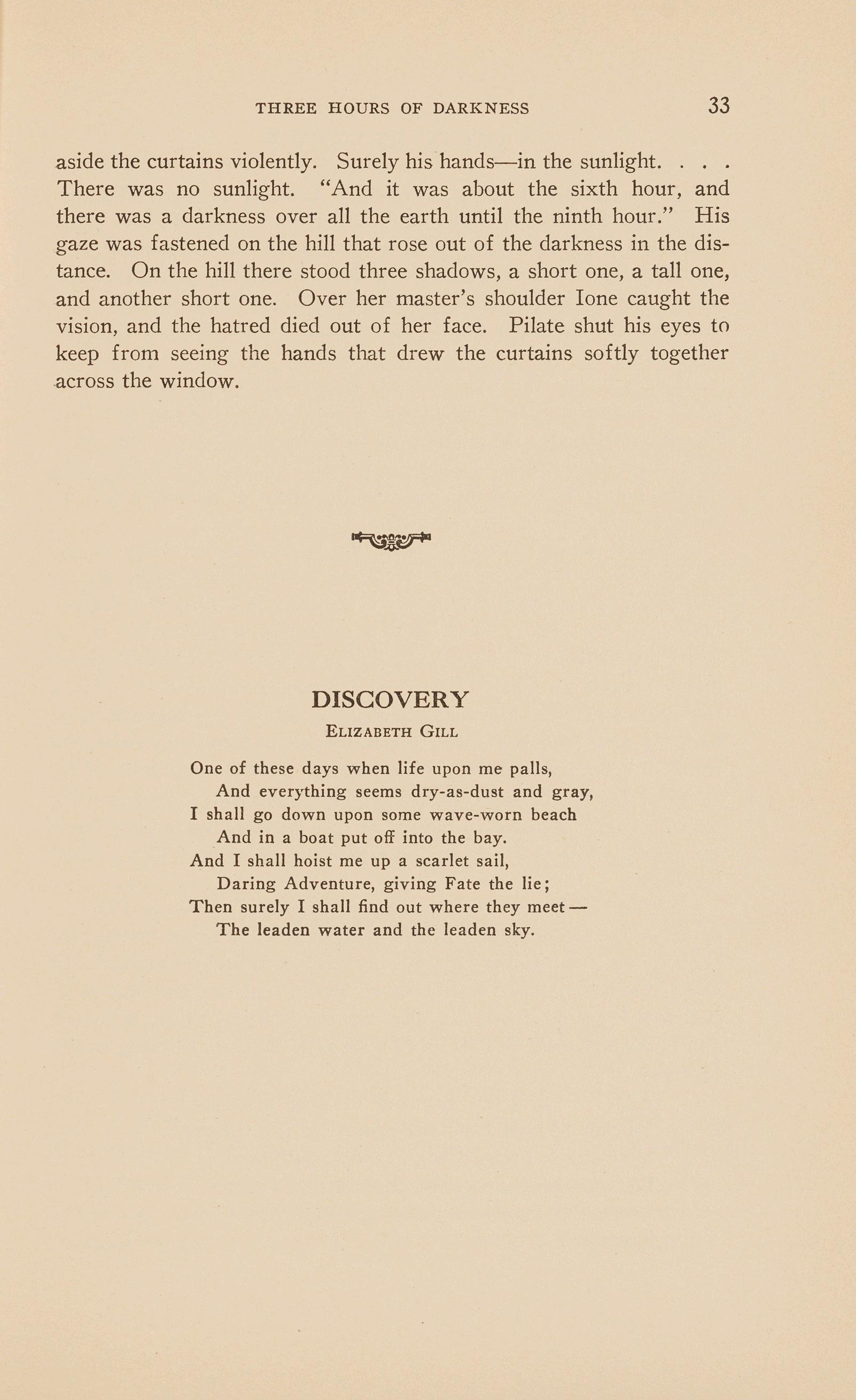
DISCOVERY
ELIZABETH GILL
One of these days when life upon me palls, And everything seems dry-as-dust and gray, I shall go down upon some wave-worn beach And in a boat put off into the bay. And I shall hoist me up a scarlet sail, Daring Adventure, giving Fate the lie; Then surely I shall find out where they meetThe leaden water and the leaden sky
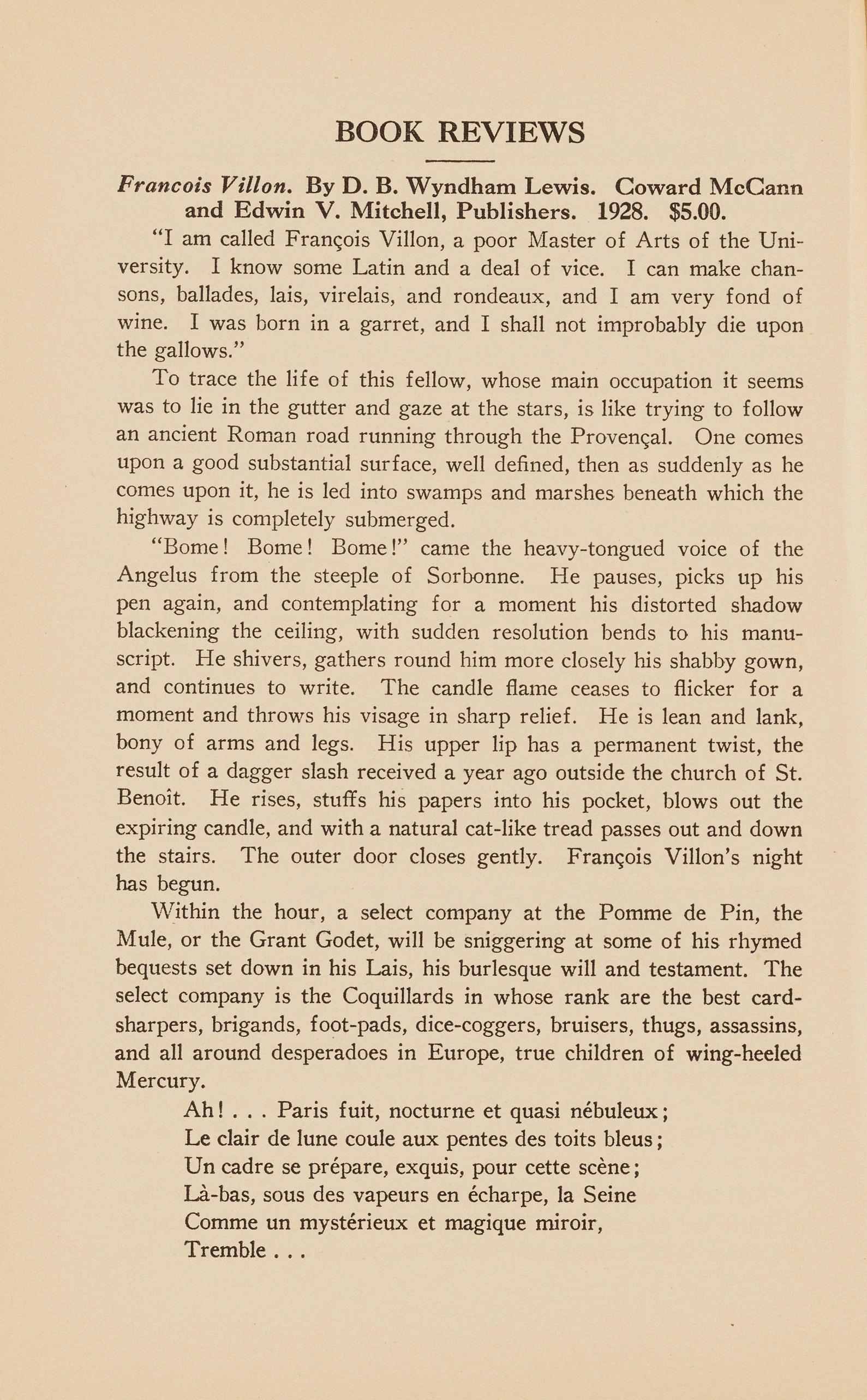
BOOK REVIEWS
Francois Villon. By D. B. Wyndham Lewis. Coward McCann and Edwin V. Mitchell, Publishers. 1928. $5.00.
"I am called Fran<;ois Villon, a poor Master of Arts of the University. I know some Latin and a deal of vice. I can make chansons, ballades, lais, virelais, and rondeaux, and I am very fond of wine. I was born in a garret, and I shall not improbably die upon the gallows."
To trace the life of this fellow, whose main occupation it seems was to lie in the gutter and gaze at the stars, is like trying to follow an ancient Roman road running through the Proven<;al. One comes upon a good substantial surface, well defined, then as suddenly as he comes upon it, he is led into swamps and marshes beneath which the highway is completely submerged.
"Borne ! Borne ! Borne!" came the heavy-tongued voice of the Angelus from the steeple of Sorbonne. He pauses, picks up his pen again, and contemplating for a moment his distorted shadow blackening the ceiling, with sudden resolution bends to his manuscript. He shivers, gathers round him more closely his shabby gown, and continues to write. The candle flame ceases to flicker for a moment and throws his visage in sharp relief. He is lean and lank, bony of arms and legs. His upper lip has a permanent twist, the result of a dagger slash received a year ago outside the church of St. Benoit. He rises, stuffs his papers into his pocket, blows out the expiring candle, and with a natural cat-like tread passes out and down the stairs. The outer door closes gently. Fran<;ois Villon's night has begun.
\Vithin the hour, a select company at the Pomme de Pin, the Mule, or the Grant Godet, will be sniggering at some of his rhymed bequests set down in his Lais, his burlesque will and testament. The select company is the Coquillards in whose rank are the best cardsharpers, brigands, foot-pads, dice-coggers, bruisers, thugs, assassins, and all around desperadoes in Europe, true children of wing-heeled Mercury.
Ah! ... Paris fuit, nocturne et quasi nebuleux; Le clair de lune coule aux pentes des toits bleus; Un cadre se prepare, exquis, pour cette scene; La-bas, sous des vapeurs en echarpe, Ia Seine Comme un mysterieux et magique miroir, Tremble ...
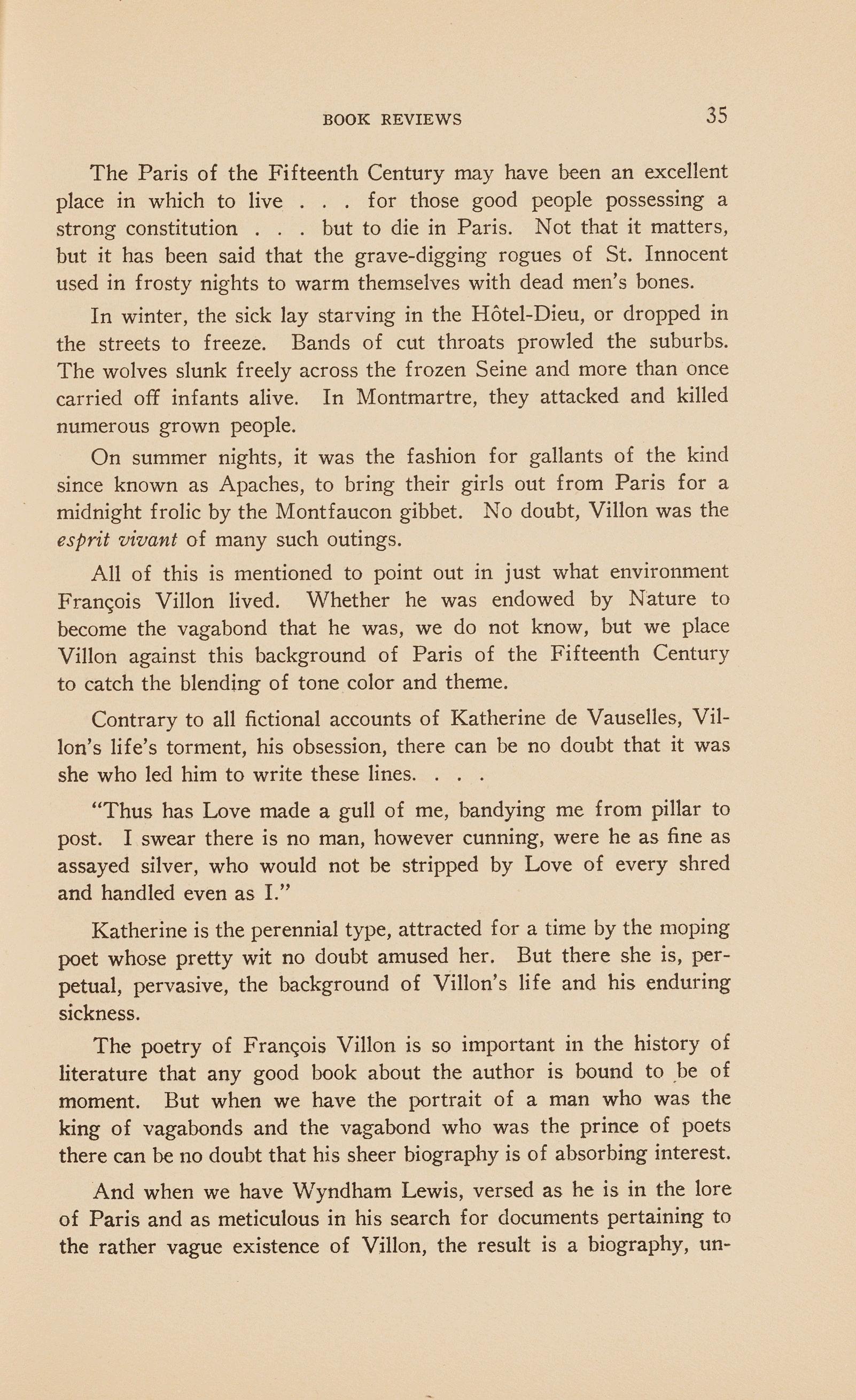
The Paris of the Fifteenth Century may have been an excellent place in which to live . . . for those good people possessing a strong constitution . . . but to die in Paris . Not that it matters, but it has been said that the grave-digging rogues of St. Innocent used in frosty nights to warm themselves with dead men's bones.
In winter, the sick lay starving in the Hotel-Dieu, or dropped in the streets to freeze. Bands of cut throats prowled the suburbs. The wolves slunk freely across the frozen Seine and more than once carried off infants alive. In Montmartre, they attacked and killed numerous grown people.
On summer nights, it was the fashion for gallants of the kind since known as Apaches, to bring their girls out from Paris for a midnight frolic by the Montfaucon gibbet. No doubt, Villon was the esprit vivant of many such outings.
All of this is mentioned to point out in just what environment Frarn;ois Villon lived. Whether he was endowed by Nature to become the vagabond that he was, we do not know, but we place Villon against this background of Paris of the Fifteenth Century to catch the blending of tone color and theme.
Contrary to all fictional accounts of Katherine de Vauselles, Villon's life's torment, his obsession, there can be no doubt that it was she who led him to write these lines. . . .
"Thus has Love made a gull of me, bandying me from pillar to post. I swear there is no man, however cunning, were he as fine as assayed silver, who would not be stripped by Love of every shred and handled even as I."
Katherine is the perennial type, attracted for a time by the moping poet whose pretty wit no doubt amused her. But there she is, perpetual, pervasive, the background of Villon's life and his enduring sickness.
The poetry of Frarn;ois Villon is so important in the history of literature that any good book about the author is bound to be of moment. But when we have the portrait of a man who was the king of vagabonds and the vagabond who was the prince of poets there can be no doubt that his sheer biography is of absorbing interest.
And when we have Wyndham Lewis, versed as he is in the lore of Paris and as meticulous in his search for documents pertaining to the rather vague existence of Vjl!on, the result is a biography, un-
surpassed, by any that we have ever read, m lyrical beauty as well as exhaustiveness of treatment.
For the past four years, the author has lived just outside of Paris working on his treatise. He is considered an authority on the period of French life and letters represented by Villon, and he has spent many months conning the old French and Latin records of France for any evidence of events in the life of the great pre-Renaissance poet.
Mr. Lewis says in his preface, "Villon I know now almost as I know some of my friends--or more so, for how much does a man know of his friends? I have figured much concerning him. I know his temperament, I know his faith, and I have at one time or other fallen into some of his follies ( excluding at this moment manslaughter and burglary). I know the fellow, his habits and his haunts."
ViIIon and Paris of the Fifteenth Century are inseparable. His verse is the living voice of a man speaking right out of that city, as though you heard him at your elbow.
Wyndham Lewis wiII long be remembered for this, a documented survey of the life and works of that elusive, romantic, almost thinstuff creature, Frarn;ois Villon.
-LAWRENCE N. BLOOMBERG.
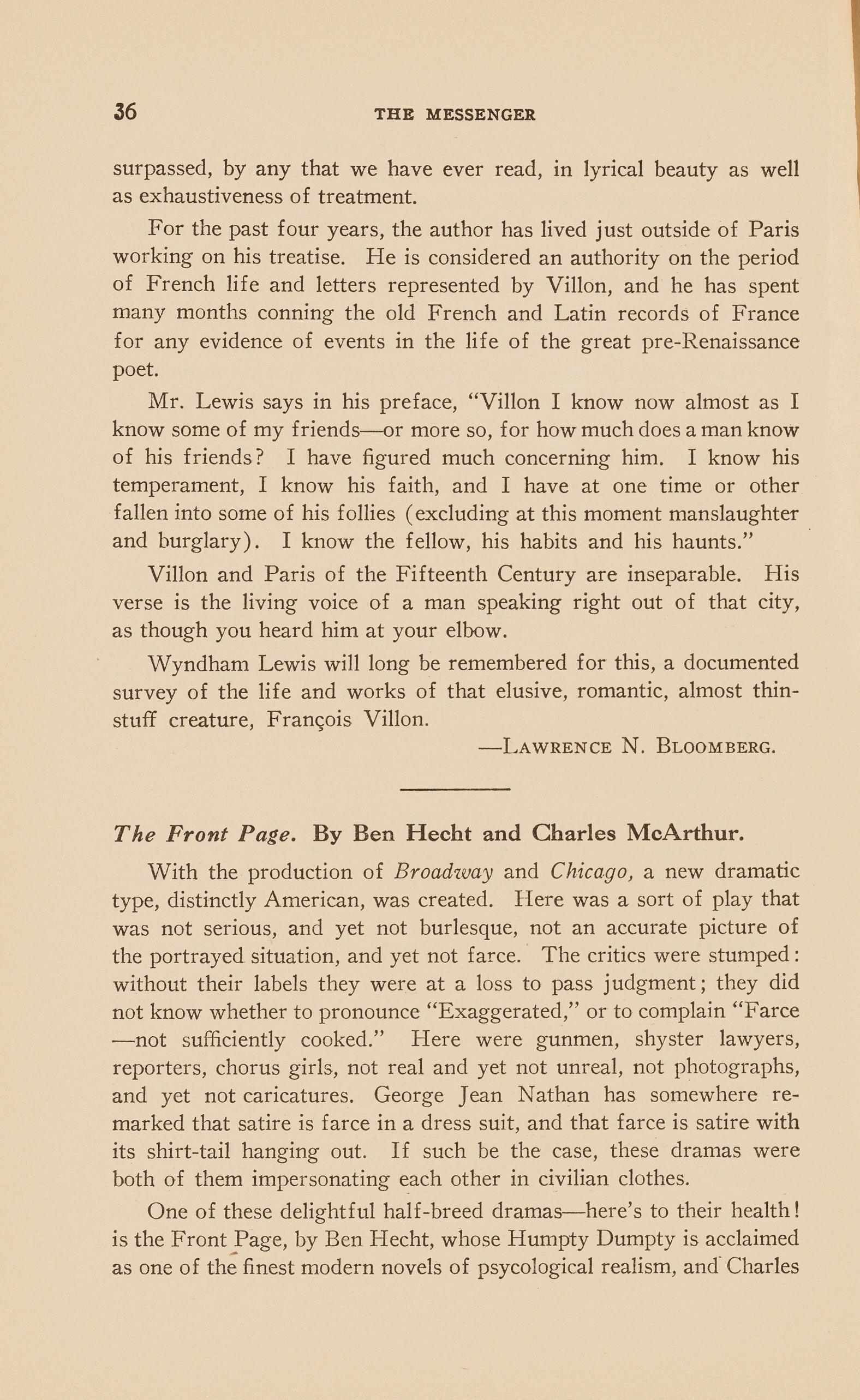
The Front Page. By
Ben Hecht and Charles McArthur.
With the production of Broadway and Chicago, a new dramatic type, distinctly American, was created. Here was a sort of play that was not serious, and yet not burlesque, not an accurate picture of the portrayed situation, and yet not farce. The critics were stumped: without their labels they were at a loss to pass judgment; they did not know whether to pronounce "Exaggerated," or to complain "Farce -not sufficiently cooked." Here were gunmen, shyster lawyers, reporters, chorus girls, not real and yet not unreal, not photographs, and yet not caricatures. George Jean Na than has somewhere remarked that satire is farce in a dress suit, and that farce is satire with its shirt-tail hanging out. If such be the case, these dramas were both of them impersonating each other in civilian clothes.
One of these delightful half-breed dramas-here's to their health! is the Front Page, by Ben Hecht, whose Humpty Dumpty is acclaimed as one of th; finest modern novels of psycological realism, and Charles
McArthur, of a varied newspaper career. As may be deduced from the title, it is a newspaper play, the entire action occurring, as it is impossible to estimate how many reviews will inform you, in the press room of the criminal courts building in Chicago, where "the most amiable and competent bums in the newspaper business" have collected to cover a hanging for their respective papers. Disgusted at not having been able to persuade the sheriff to move the hanging up two hours, so that they might make the evening edition, they are discovered in various postures around a poker table, commenting on the situation-but there is not space enough to give a synopsis . Get the play and read it. Three acts of more enjoyable, bawdy , uproarious, and melodramatic scoopings, intrigues, ten-twentythirty, blah you will find nowhere. The authors label it a farce; but it is obvious that they do not con sider it actually so: too many of the jibes and thrusts at authority and dignity are so potent and well-aimed as to let you know that such a label is only a measure of self-protection . For the critics can't howl quite so loudly when you put A Farc e on the second line of the bill.
The financial success of this, as well as of its two predecessors, indicates that the public, at all events, likes this sort of thing. And so we have a lean triumvirate of plays distinctly unlike anything previous, distinctly enjoyable, and distinctly-and this is rare-American.
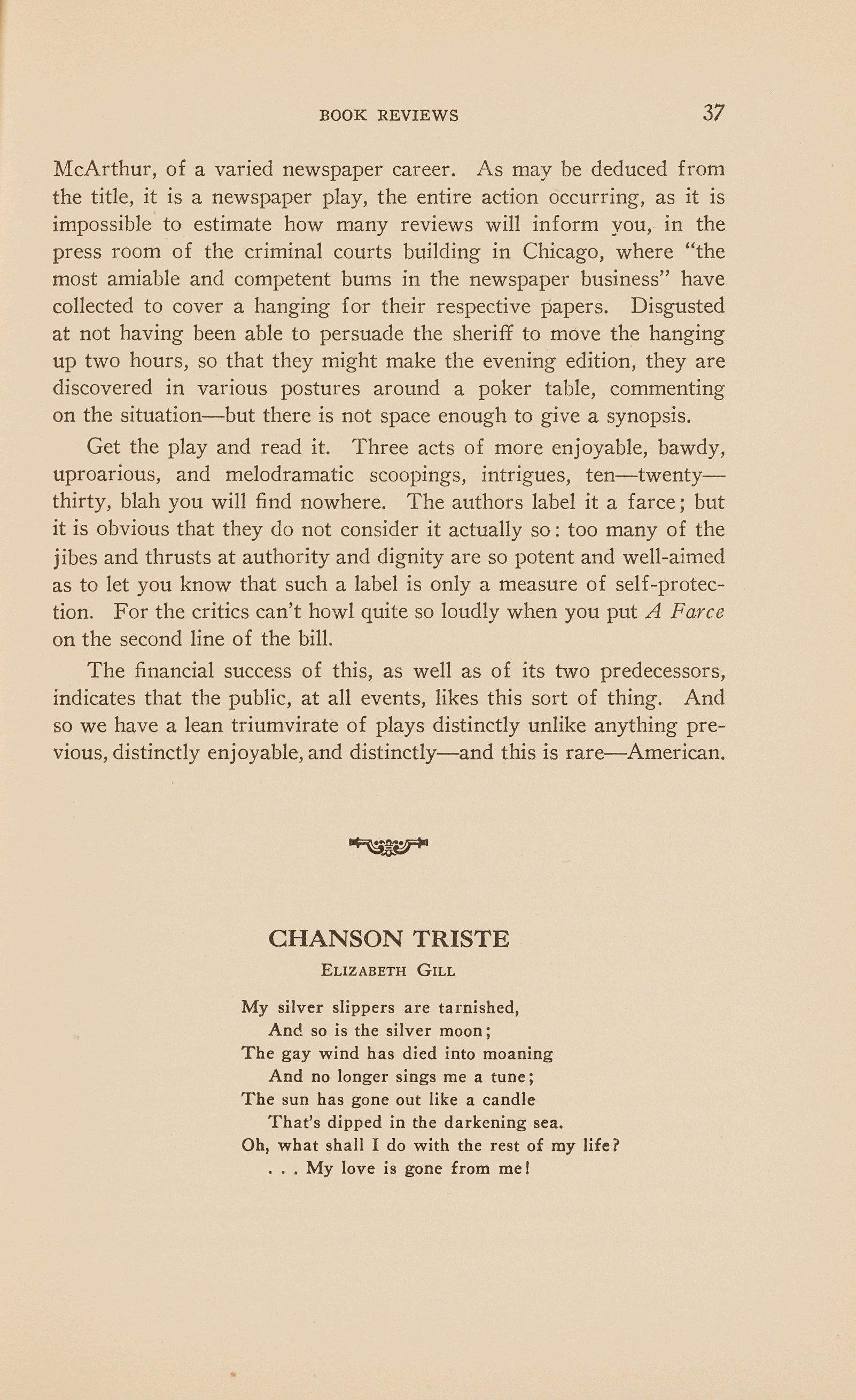
CHANSON TRISTE
ELIZABETH GILL
My silver slippers are tarnished, And so is the silver moon; The gay wind has died into moaning And no longer sings me a tune; The sun has gone out like a candle That's dipped in the darkening sea. Oh, what shall I do with the rest of my life? ... My love is gone from me l
ELMER POTIER
THE MESSENGER
RICHMOND COLLEGE
J. HARRIS WELSH •
H. G. KINCHELOE
LAWRENCE BLOOMBERG
BRUCE MoRRISSETII! •
CARROL T. TAYLOR
LLOYD CASTER •
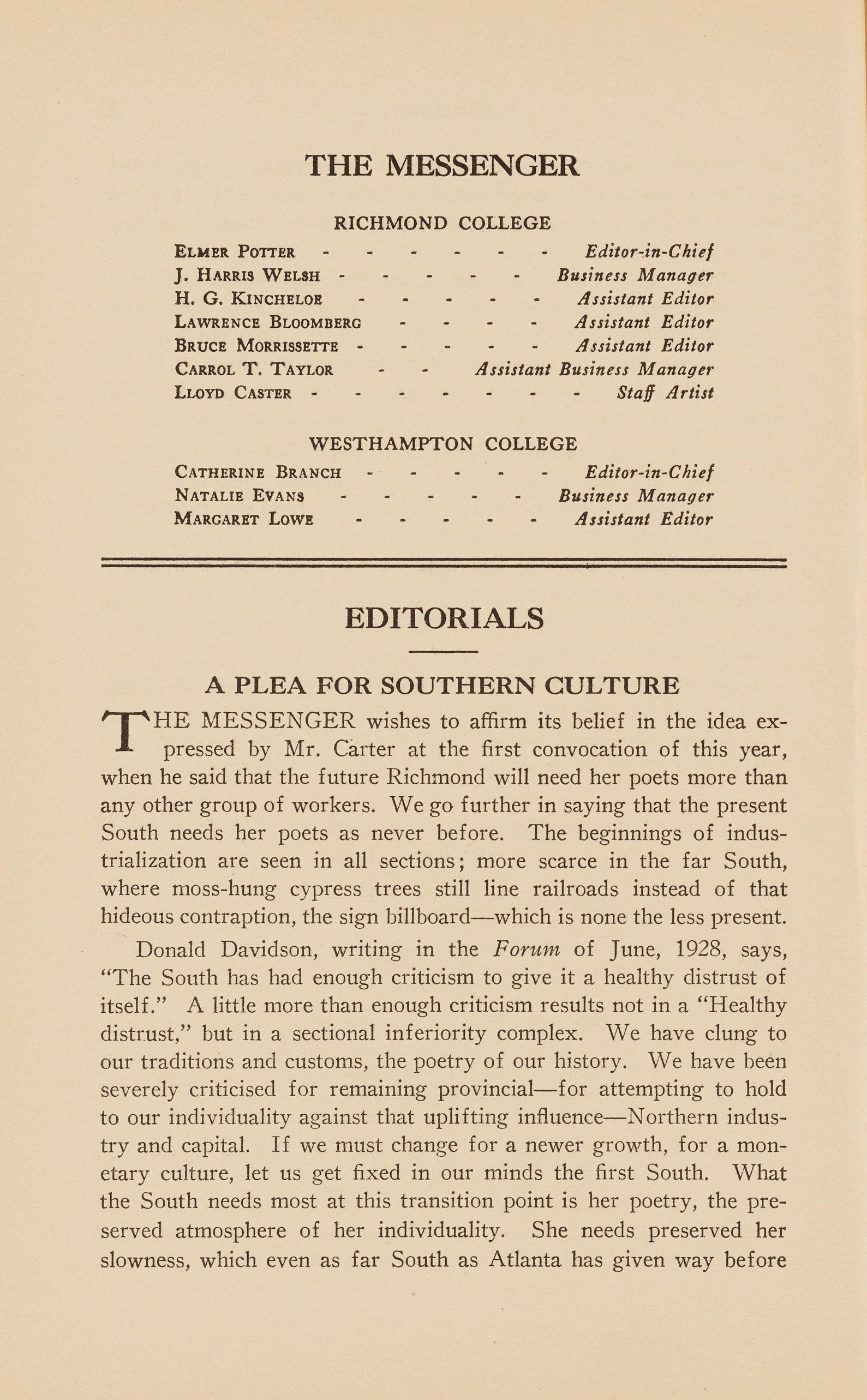
Editor-in-Chief
Business Manager
11.ssistant Editor
Assistant Editor
Assistant Editor
Assistant Business Manager
Staff Artist
WESTHAMPTON COLLEGE
CATHERINE BRANCH •
NATALI!! EVANS
MARGARET LOW!
TEditor-in-C hie/
Business Manager
Assistant Editor
EDITORIALS
A PLEA FOR SOUTHERN CULTURE
HE MESSENGER wishes to affirm its belief in the idea expressed by Mr. Carter at the first convocation of this year, when he said that the future Richmond will need her poets more than any other group of workers. We go further in saying that the present South needs her poets as never before. The beginnings of industrialization are seen in all sections; more scarce in the far South, where moss-hung cypress trees still line railroads instead of that hideous contraption, the sign billboard-which is none the less present. Donald Davidson, writing in the Forum of June, 1928, says, "The South has had enough criticism to give it a healthy distrust of itself." A little more than enough criticism results not in a "Healthy distrust," but in a sectional inferiority complex. We have clung to our traditions and customs, the poetry of our history. We have been severely criticised for remaining provincial-for attempting to hold to our individuality against that upli £ting influence-Northern industry and capital. If we must change for a newer growth, for a monetary culture, let us get fixed in our minds the first South. \Vhat the South needs most at this transition point is her poetry, the preserved atmosphere of her individuality. She needs preserved her slowness, which even as far South as Atlanta has given way before
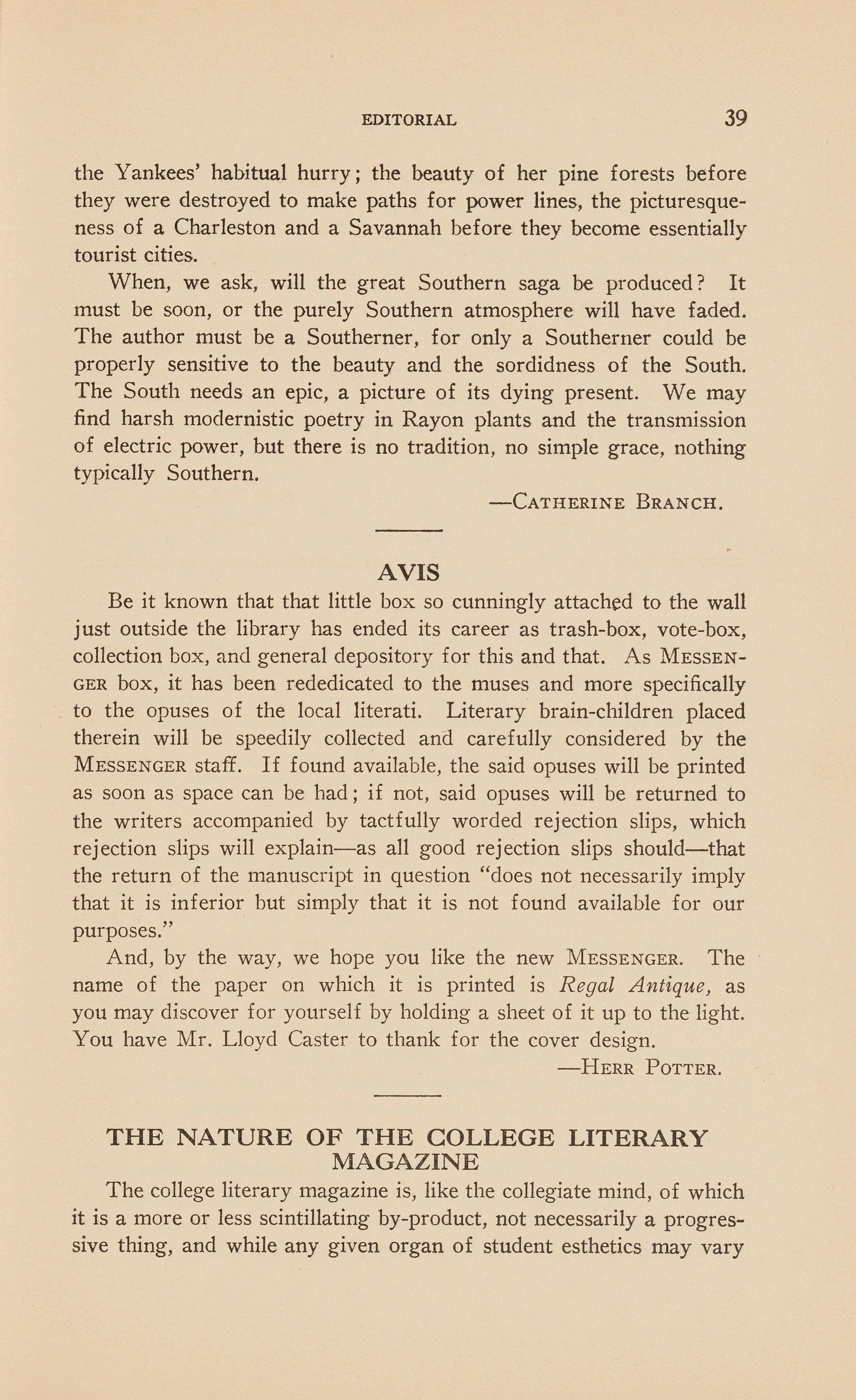
the Yankees' habitual hurry; the beauty of her pine forests before they were destroyed to make paths for power lines, the picturesqueness of a Charleston and a Savannah before they become essentially tourist cities.
When, we ask, will the great Southern saga be produced? It must be soon, or the purely Southern atmosphere will have faded. The author must be a Southerner, for only a Southerner could be properly sensitive to the beauty and the sordidness of the South. The South needs an epic, a picture of its dying present. We may find harsh modernistic poetry in Rayon plants and the transmission of electric power, but there is no tradition, no simple grace, nothing typically Southern.
-CATHERINE BRANCH.
AVIS
Be it known that that little box so cunningly attached to the wall just outside the library has ended its career as trash-box, vote-box, collection box, and general depository for this and that. As MESSENGERbox, it has been rededicated to the muses and more specifically to the opuses of the local literati. Literary brain-children placed therein will be speedily collected and carefully considered by the MESSENGERstaff. If found available, the said opuses will be printed as soon as space can be had; if not, said opuses will be returned to the writers accompanied by tactfully worded rejection slips, which rejection slips will explain-as all good rejection slips should-that the return of the manuscript in question "does not necessarily imply that it is inferior but simply that it is not found available for our purposes."
And, by the way, we hope you like the new MESSENGER. The name of the paper on which it is printed is Regal Antique, as you may discover for yourself by holding a sheet of it up to the light. You have Mr. Lloyd Caster to thank for the cover design.
-HERR POTTER.
THE NATURE OF THE COLLEGE LITERARY MAGAZINE
The college literary magazine is, like the collegiate mind, of which it is a more or less scintillating by-product, not necessarily a progressive thing, and while any given organ of student esthetics may vary
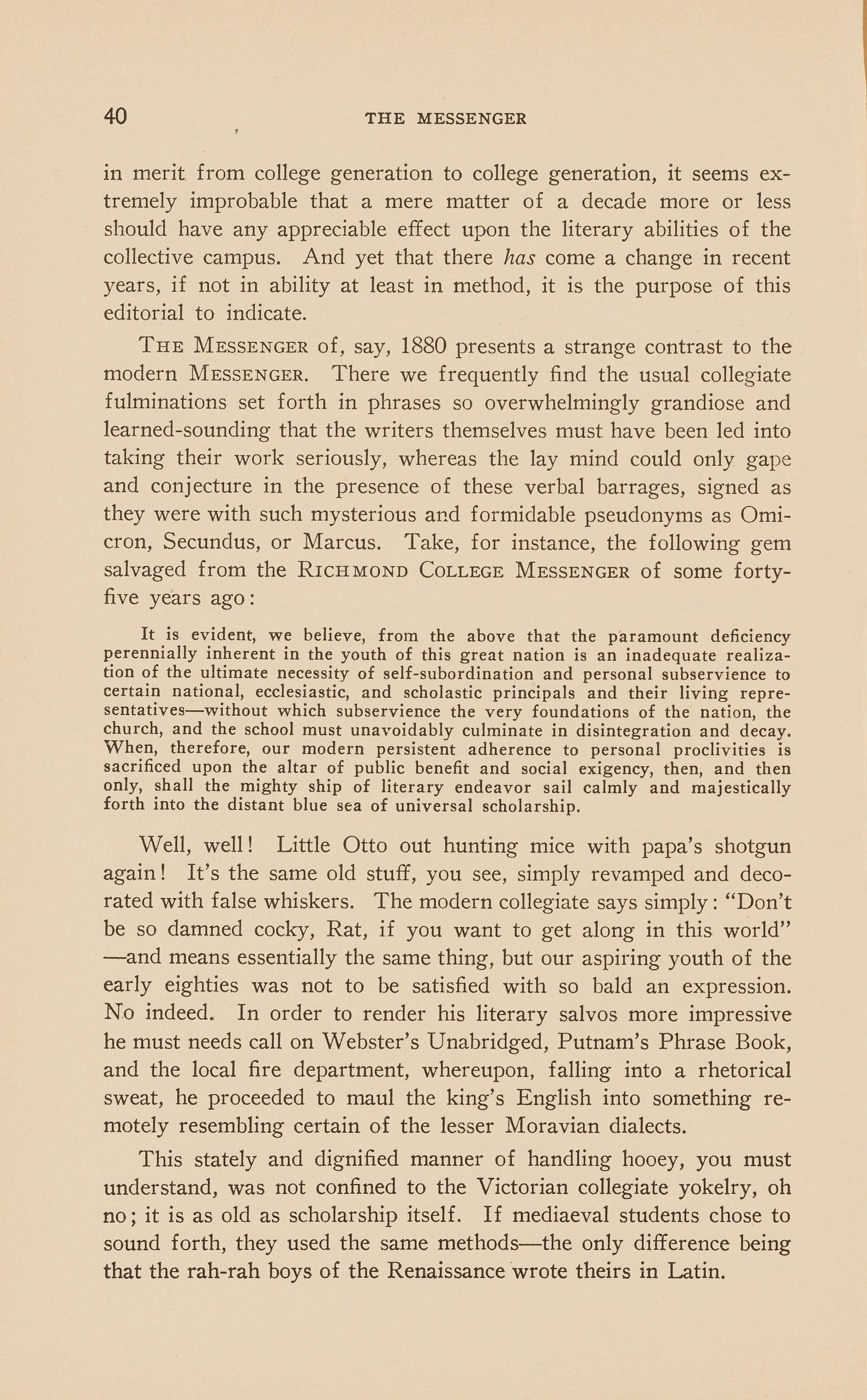
in merit from college generation to college generation, it seems extremely improbable that a mere matter of a decade more or less should have any appreciable effect upon the literary abilities of the collective campus. And yet that there has come a change in recent years, if not in ability at least in method, it is the purpose of this editorial to indicate.
THE MESSENGERof, say, 1880 presents a strange contrast to the modern MESSENGER. There we frequently find the usual colleg iate fulminations set forth in phrases so overwhelmingly grandiose and learned-sounding that the writers themselves must have been led into taking their work seriously, whereas the lay mind could only gap e and conjecture in the presence of these verbal barrages, signed as they were with such mysterious ar.d formidable pseudonyms as Omicron, Secundus, or Marcus. Take, for instance, the following gem salvaged from the RICHMONDCOLLEGEMESSENGERof some fortyfive years ago:
It is evident, we believe, from the above that the paramount deficiency perennially inherent in the youth of this great nation is an inadequate realization of the ultimate necessity of self-subordination and personal subservience to certain national, ecclesiastic, and scholastic principals and their living representatives-without which subservience the very foundations of the nation, the church, and the school must unavoidably culminate in disintegration and decay. When, therefore, our modern persistent adherence to personal proclivities is sacrificed upon the altar of public benefit and social exigency, then, and then only, shall the mighty ship of literary endeavor sail calmly and majestically forth into the distant blue sea of universal scholarship.
Well, well! Little Otto out hunting mice with papa's shotgun again! It's the same old stuff, you see, simply revamped and decorated with false whiskers. The modern collegiate says simply: "Don't be so damned cocky, Rat, if you want to get along in this world" -and means essentially the same thing, but our aspiring youth of the early eighties was not to be satisfied with so bald an expression. No indeed. In order to render his literary salvos more impressive he must needs call on Webster's Unabridged, Putnam's Phrase Book, and the local fire department, whereupon, falling into a rhetorical sweat, he proceeded to maul the king's English into something remotely resembling certain of the lesser Moravian dialects.
This stately and dignified manner of handling hooey, you must understand, was not confined to the Victorian collegiate yokelry, oh no; it is as old as scholarship itself. If mediaeval students chose to sound forth, they used the same methods - the only difference being that the rah-rah boys of the Renaissance wrote theirs in Latin.
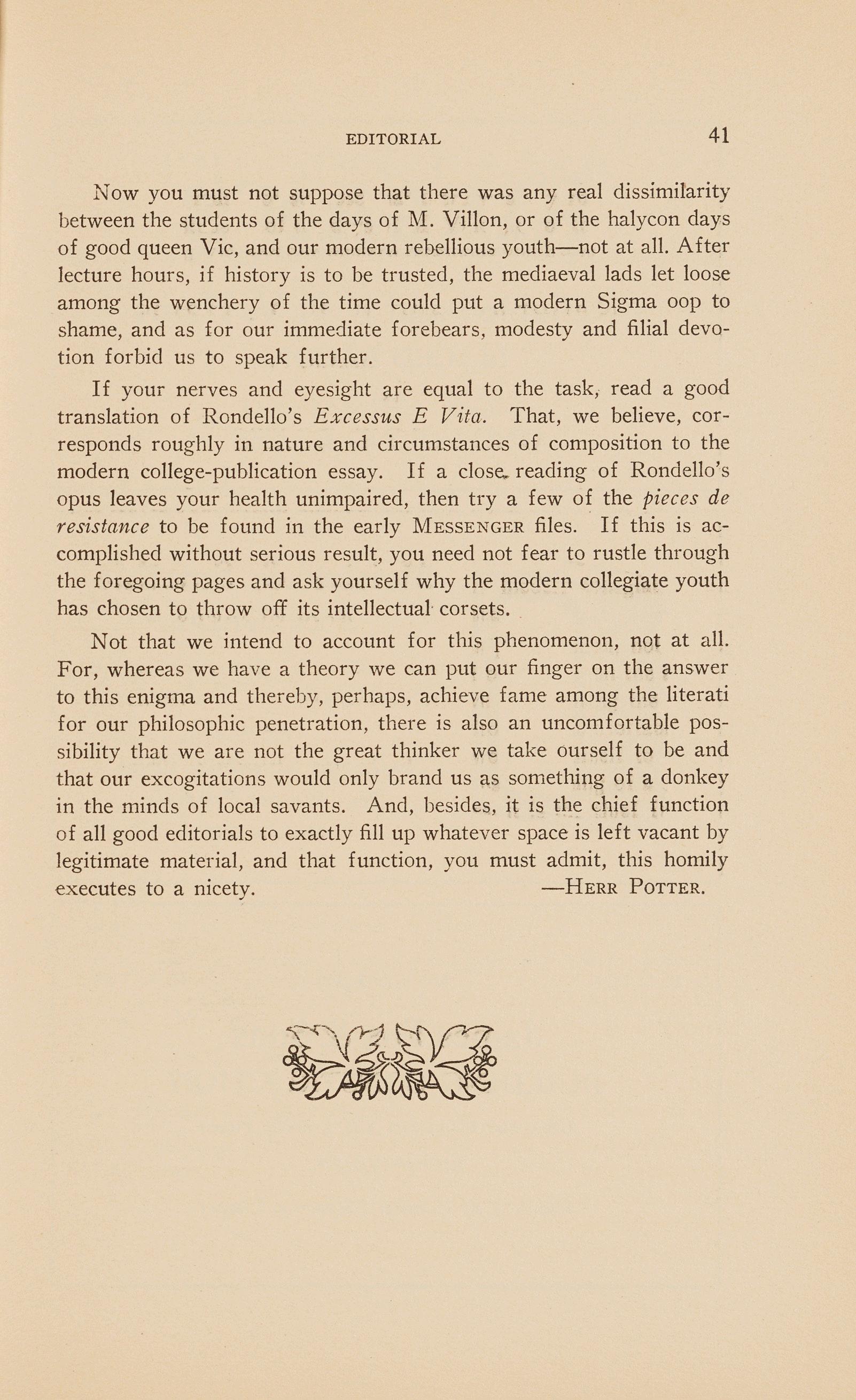
Now you must not suppose that there was any real dissimilarity between the students of the days of M. Villon, or of the halycon days of good queen Vic, and our modern rebellious youth-not at all. After lecture hours, if history is to be trusted, the mediaeval lads let loose among the wenchery of the time could put a modern Sigma oop to shame, and as for our immediate forebears, modesty and filial devotion forbid us to speak further.
If your nerves and eyesight are equal to the task, read a good translation of Rondello's Excessus E Vita. That, we believe, corresponds roughly in nature and circumstances of composition to the modern college-publication essay. If a close. reading of Rondello's opus leaves your health unimpaired, then try a few of the pieces de resistance to be found in the early MESSENGER files. · If this is accomplished without serious result, you need not fear to rustle through the foregoing pages and ask yourself why the modern collegiate youth has chosen to throw off its intellectuaJ. corsets.
Not that we intend to account for this phenomenon, not at all. For, whereas we have a theory we can put our finger on the answer to this enigma and thereby, perhaps, achieve fame among the literati for our philosophic penetration, there is also an uncomfortable possibility that we are not the great thinker we take ourself to be and that our excogitations would only brand us as something of a donkey in the minds of local savants. And, besides, it is the chief function of all good editorials to exactly fill up whatever space is left vacant by legitimate material, and that function, you must admit, this homily executes to a nicety. -HERR POTTER.
BACON
POUND BOXES
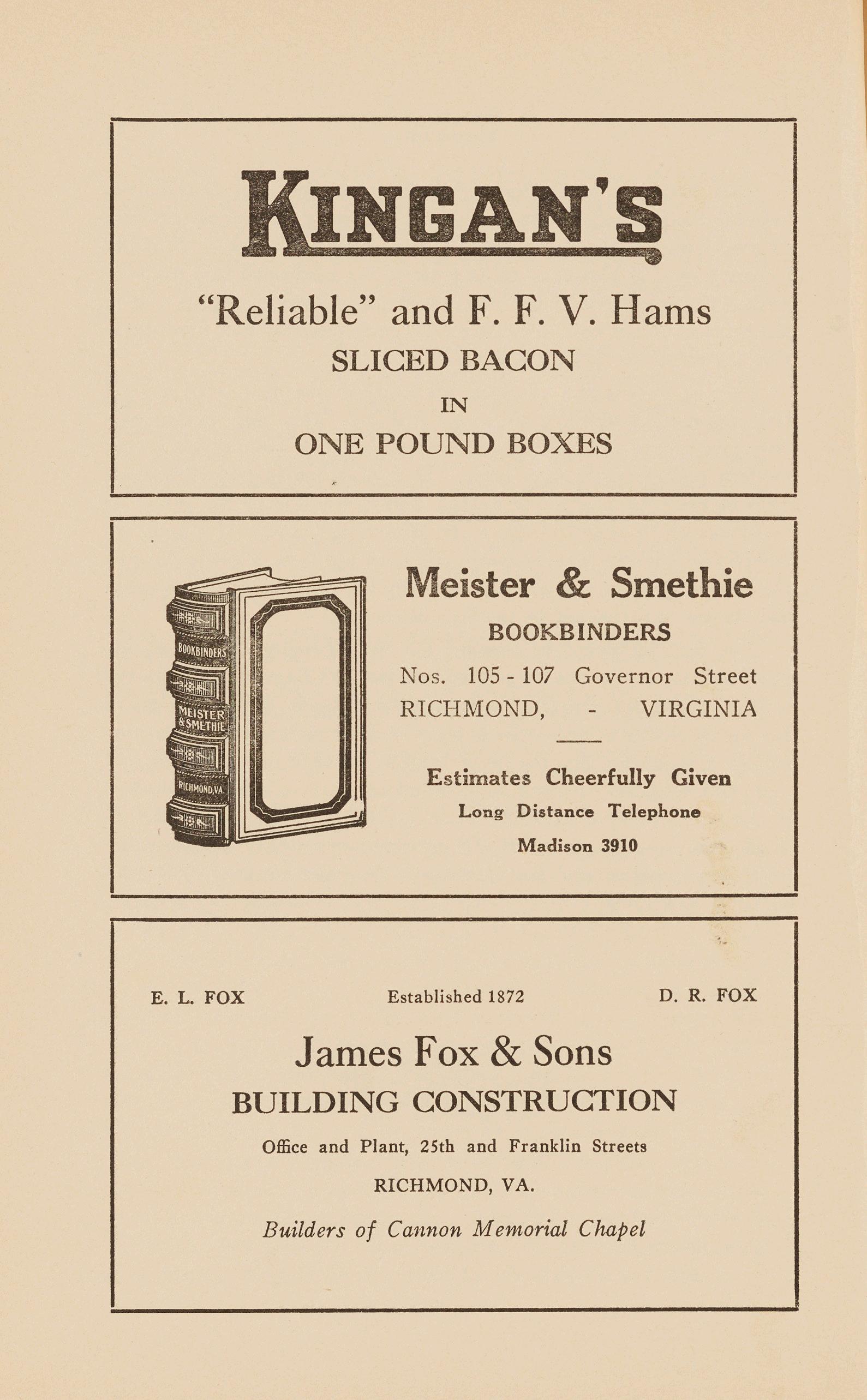
Meister & Smethie BOOKBINDERS
No s. 105 -107 Governor Street RICHMOND, VIRGINIA
E s timates Cheerfully Given Long Distance Telephone Madison 3910 Established 1872
James Fox & Sons
BUILDING CONSTRUCTION
Office and Plant, 25th and Franklin Streets
RICHMOND, VA.
Builders of Cannon Memorial Chapel
